Flint Marks First MBBA Capital Connect Cohort in Statewide Expansion
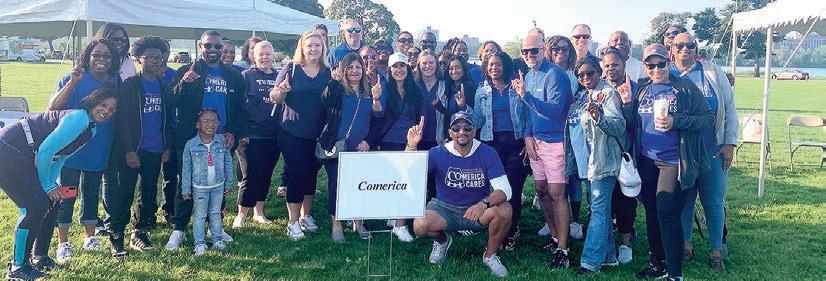



By Governor Gretchen Whitmer
By Ebony JJ Curry SENIOR REPORTER
August is Black Business Month in Michigan, a time when we celebrate Black businesses and honor all they do to enrich our neighborhoods, communities, and state. This month, I am working hard to support Black small business owners and help more people ‘make it’ in Michigan.
Late Thursday night, Sept. 14, a historic moment unfolded in American labor relations as the United Auto Workers (UAW) union initiated a strike against Ford, General Motors (GM), and Stellantis. For the first time, the union took simultaneous action against all three major Detroit-based automakers. The action involves approximately 13,000 UAW members in assembly plants across Michigan, Ohio, and Missouri, who walked off their jobs after existing labor contracts expired at 11:59 p.m.
To a business owner, there is no such thing as a “small” business. Entrepreneurs put in countless early mornings and late nights, choosing Michigan to chase their dreams, raise their families, and make a difference. But small businesses face numerous challenges from high startup costs to burdensome red tape. That’s why my administration is working hard to support businesses with the resources they need to succeed.
By Ebony JJ Curry SENIOR REPORTER
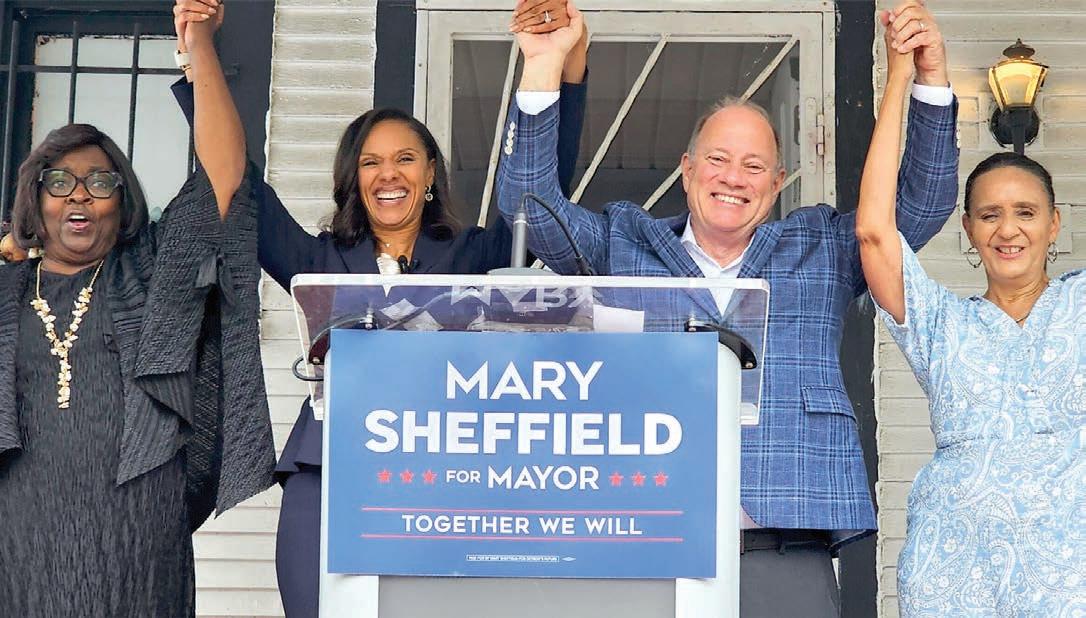
Itroiters. The symbolism of Black beekeepers revitalizing their city is a powerful testament to the resilience and ingenuity of our community.

n a breathtaking celebration of talent, determination, and the unyielding spirit of Black excellence, the Michigan Chronicle marked its 10th Annual 40 Under 40 event Thursday evening. This year’s soirée, drenched in the theme “All Black Everything with Gold Accents,” transcended expectations and essentially illuminated the golden gems within the true essence of Black excellence. Hosted by the charismatic duo of Andre Ash and Lynzee Mychael from Michigan Chronicle’s Finally Friday, the night was a triumph for the city of Detroit and its vibrant community of young Black professionals.
As the night unfolded, we had the privilege of honoring other outstanding individuals, each carving their own path to success. Clement “Fame” Brown, the creative mind behind Three Thirteen Detroit’s Brand Name, received the prestigious Entrepreneur of the Year Award. Brown’s commitment to empowering the city through fashion and entrepreneurship has left an indelible mark.
By Sam Robinson SENIOR REPORTER
The evening sparkled with a golden promise as we celebrated remarkable individuals from various walks of life. Among the honorees were the brilliant and visionary co-founders of Detroit Hives, Nicole Lindsey and Timothy Paul Jackson. Their work has not only changed the landscape of beekeeping and urban farming in Detroit but also exemplified the transformative impact Black professionals can have on their communities.
Sept. 14, GM released a statement expressing disappointment with the strike action, despite offering what it termed an “unprecedented economic package” that included historic wage increases. Stellantis also expressed disappointment in a statement, saying the company immediately went into contingency mode to protect its operations.
We set and exceeded targets in state contracting with previously disadvantaged businesses. Our Small Business Venture Capital program has awarded more than $40 million to connect new tech companies with capital. We launched the MI Economic Opportunity Fund, a $10 million microloan program to help women and entrepreneurs of color get their small businesses off the ground. The Michigan Economic Development Corporation’s 27 Small Business Support Hubs help entrepreneurs navigate Michigan’s business ecosystem.
“Entrepreneur of the year – that’s a big deal,” said Brown. “It’s always an honor to be honored and it’s always a blessing to be in a room full of so many talented, accomplished, and popular people that look like me. I’m geeked. I started making and selling clothes as a kid and I always knew that I would have a business, but I never knew it would be Detroit’s brand name business, so I take a lot of pride in the fact that our business represents our city’s pride.”
Detroit Mayor Mike Duggan endorsed City Council president Mary Sheffield for Detroit mayor on Wednesday outside of a woman’s home off Woodward Ave., he said, is an example of the cooperation between the mayor’s office and council.
By Ebony JJ Curry SENIOR REPORTER
“Together we have created a social, environmental, and financial impact through bees,” said Jackson. Lindsey followed that sentiment with, “It is through our local partnerships and collaborative efforts that we exist in over 28 plus locations managing the health of 4.5 million honeybees – humbly speaking our movement has inspired others locally, nationally, and even internationally to take on similar missions.”
The UAW has branded the industrial action as the “Stand-Up Strike,” focusing on specific plants within each automaker. UAW President Shawn Fain stated, “This strategy will keep the companies guessing. It will give our national negotiators maximum leverage and flexibility in bargaining. And if we need to go all out, we will. Everything is on the table.” Union leaders have also indicated that additional plants could be targeted in future waves if negotiations remain stalled.
“Her story represents the story of thousands of Detroiters whose lives have been impacted because of our collaborative work.”
Taking home the Corporate Excellence Award was Dannis Mitchell, Director of Community Engagement at Barton Malow.
Supporters of Sheffield and her staff gathered outside the home of Geraldine Noble, who received a roof repair grant through a city program Duggan credited Sheffield with expanding.
For many Detroiters, Interstate 375, or I-375, has long been just another stretch of urban highway, a concrete artery connecting different parts of the city. To some, it’s a mere convenience; to others, it’s an unremarkable part of their daily commute. However, there’s a deeper, far more troubling story beneath the surface of this seemingly ordinary freeway—a story of pain, displacement, and the lasting impact on Black Detroiters.
Kinloch’s campaign, after the endorsement, released a statement declaring that voters, not endorsements, decide elections.
By Andre Ash
ness district that had been the lifeblood of the community.
“Mayor Mike Duggan doesn’t get the right to decide his successor,” Kinloch said. “The voters in Detroit will determine the next Mayor in November.”
DIGITAL ANCHOR
know three things, she will work to build this city up with unity, not division. She’ll take Detroit’s recovery farther into the neighborhoods and reach more people, and she will move this city forward and not backward. That’s why on Nov. 4 I will be voting for the next mayor of the city of Detroit, Mary Sheffield.”
Duggan said he knew he would vote for Sheffield the day she announced her campaign back in January.
Detroit Hives, a pioneering organization founded by Lindsey and Jackson, harnesses the power of urban beekeeping to revitalize neighborhoods in the Motor City. Their initiative not only addresses critical issues like environmental conservation but also provides valuable education and employment opportunities to Black De-
Duggan said his endorsement isn’t against Triumph Church pastor Rev. Solomon Kinloch, Sheffield’s opponent, who he considers “a good friend of mine, and is a wonderful religious leader in our community.”
“It is so important to recognize that there are young leaders across the country, many that are born here in Detroit. I represent our city nationally and I tell people, ‘Yea I’m a D-girl I’m from the west-side of Detroit,’” Mitchell expressed. “But more importantly, I’ve been able to have experiences within an industry that not many of us, specifically women of color, have the opportunity to engage in and I’ve been the youngest person in the room, the only Black person in the room, and the only Sistah in the room, and I really had to articulate the importance of showing up, giving chances when others won’t, and being persistent.” As a trailblazing Black woman thriving in a predominantly male-dominated industry, her unwavering commitment to fortifying the connections between businesses and Detroit’s communities is unde-
It’s a history marred by pain, injustice, and economic devastation. More than 130,000 residents, primarily Black, were forcibly displaced. Families were uprooted, generational wealth was obliterated, and a thriving community was torn asunder. The wounds inflicted by I-375 run deep, transcending the physical barrier of a freeway to penetrate the very soul of Black Detroiters.
towards mending the wounds inflicted on Black Detroiters and restoring a sense of belonging that was so callously torn away in the past.
Sheffield said she’s been intentional about pushing a positive environment on the council in which the body works together with the mayor’s office instead of always fighting it. However, she wasn’t shy to point out the times she’s differed from the mayor’s agenda.
A string of shootings in Greektown in mid-April left both visitors and residents of this bustling downtown destination in awe. One of these shootings tragically claimed the life of a popular and beloved security guard following a dispute with a patron.
The I-375 Boulevard Project is about more than just correcting historical injustices; it’s about redefining the future. It will connect downtown Detroit to surrounding neighborhoods, bridging the gap that was placed upon the city decades ago.
We are cutting red tape so entrepreneurs can get more done and chase their next big idea. Our innovation fund and R&D tax credit are lowering the cost of entrepreneurship and creating thousands of good-paying Michigan-based jobs. Just last week, I signed bills cutting red tape for small distillers and mixed spirit manufacturers, allowing them to share costs like rent, equipment, utilities, and space. I’m working with Michigan’s Department of Licensing and Regulatory Affairs (LARA) to cut red tape and refund fees and called on the legislature to work with me to put LARA’s recommendations into state law.
This painful legacy can be traced back to the nation’s interstate highway program of 1956—a program that aimed to connect the country but often did so at the expense of marginalized communities. In the case of I-375, it meant carving a path through the heart of Black Detroit, reinforcing segregation, and perpetuating inequality.
“We know Mike Duggan and myself have not always agreed on everything, and I think that is very normal and natural for the executive branch and legislative branch to not always agree on everything,” Sheffield said.
The male suspect allegedly shot the guard before fleeing the scene, while his female companion is accused of concealing the weapon in her bra.
By Andre Ash
DIGITAL ANCHOR
Fain clarified the union’s strategy: “I want to give a major shoutout to the thousands of members who are on the picket lines right now fighting for all of us. The Stand-Up Strike is a new approach to striking. Instead of striking all plants at once, select locals will be called on to stand up and walk out on strike. This is our generation’s answer to the movement that built our union – the sit-down strikes of 1937. We told the Big 3 that Sept. 14 was the deadline and we meant it. We gave the companies our economic demands eight weeks ago and it took more than a month to get to the table.”
We’re seeing results from our work to make Michigan a better place to do business. Neighborhoods in Detroit are buzzing with new ideas and startups. Organizations like Black Tech Saturdays are helping Black entrepreneurs and innovators get their start. For the third year in a row, CNBC ranked Michigan as a top 10 state for business because to our growing economy, quality of life, infrastructure, and low cost of business.
The tale begins in what is now Lafayette Park, once known as Black Bottom—a neighborhood rooted in African-American culture and history. Named after its dark, fertile soil, Black Bottom flourished during the mid1900s, nurturing the dreams and aspirations of prominent Detroiters like Coleman Young, Joe Louis, and numerous other Detroit legends. But in the name of urban renewal in the 1950s, this vibrant neighborhood was systematically dismantled, erased from the map, and replaced by a lifeless stretch of asphalt.
“We don’t have coronations. A mayoral endorsement won’t stop the violence in our streets. It won’t ensure a better education or create more opportunities for our children. After 12 years on the Detroit City Council—and 4 more as Council President—if you haven’t fixed it by now, you’re not going to,” Kinloch said in a statement. “Detroit doesn’t need recycled ideas or the same politics that have left too many neighborhoods behind. Detroit needs fresh leadership, with the courage to do what career politicians couldn’t.”
A Holistic Approach to Providing Shelter and Support for Detroit’s Unhoused People
“You know what it takes to run a $2 billion city budget with the laws of the water department, the federal government, the state government the county government, the law enforcement side, and I’ve watched the council president for 12 years dig into every one of these issues,” Duggan said. “She is prepared for the job.”
“I believe it’s fitting that we’re here at Miss Geraldine’s home,” Sheffield said.
Duggan, who is running for governor as an independent, said that despite his expectation that Sheffield will make different decisions as mayor, he trusts her leadership because “she will work to build this city up.”
For one to aptly recognize the harm caused by such projects, it is vital to note that some of the planners and politicians behind those projects built them directly through the heart of vibrant, populated communities—oftentimes to reinforce segregation and sometimes as part of a direct effort to replace or eliminate Black neighborhoods.
Today, the resurgence of Paradise Valley stands as a testament to the indomitable spirit of Black Detroiters and the enduring legacy of Black excellence. This historic district, once a vibrant hub for Black businesses and culture, is experiencing a renaissance that harkens back to its glory days. The destruction of Black Bottom may have torn apart a thriving community, but the resolute determination of a new generation of entrepreneurs and visionaries is reclaiming that lost legacy.
These incidents unfolded during an unseasonably warm spring, leading to increased pedestrian traffic and heightened tensions in the densely populated downtown area.
She pointed to a senior home repair program that was slated to be cut until “tough discussions” in the mayor’s office yielded an expansion of the program that helped the homeowner, Noble, repair her home on a fixed income.
The surge in crime and the influx of visitors to Detroit’s downtown core garnered the attention of the Detroit Police Department (DPD), catching them somewhat off guard.
“She’s got a different style than I do, she’s going to do different policies than I am — she’s going to make different decisions. But I am 100% behind her because I
Sheffield would become Detroit’s first woman mayor. She would also become the first person from the council to be elected mayor since 1947, Duggan mentioned Wednesday.
While the residential areas bore the brunt of this demolition, the heart of Black Bottom, its thriving business center, remained largely untouched. Restaurants, theaters, clubs, and bars—the very places that brought Detroit’s Black community together—were concentrated around Hastings Street, the epicenter of African-American culture in the city.
Housing Resource Helpline in response to the challenges that residents face in navigating the complex system of housing services. The helpline provides a single point of contact for people seeking housing assistance and connects them with the resources they need.
The union is pushing for a comprehensive list of demands. This
Homelessness continues to plague urban communities, with families and individuals grappling with the challenges of making ends meet in today’s economic climate. Whether it’s struggling to meet monthly mortgage payments or coping with soaring rental costs in a housing market marked by shockingly high prices, a variety of factors contribute to the growing issue of people becoming unhoused.
While I’m proud of the progress we’ve made, there is so much more to do. Michigan can and should be a place where no matter your dream, your idea, or your business— whether you’re a mom and pop restaurant or a high-tech startup—you can succeed. This Black Business Month, I’ll keep working to make that Michigan a reality.
By Ebony JJ Curry SENIOR REPORTER
Meagan DunnJulie Schneider
Historically, shelters have provided a temporary respite for those in need, often serving as the first or second option after exhausting alternatives like staying with friends or family. Shelters offer a place to rest one’s head and a warm meal, albeit sometimes for extended periods. For others, being unhoused means living in cars or makeshift outdoor settings.
Then, in a cruel twist of fate, Hastings Street, too, was obliterated a few years later, making way for the construction of I-375. This marked the final blow, sealing the fate of Black Bottom and signaling the beginning of the end for Paradise Valley, the Black busi-
Support for the helpline comes from the Gilbert Family Foundation, which has pledged $10 mil-
But now, after decades of enduring the scars of I-375, there is a glimmer of hope on the horizon. Plans have been unveiled to transform this once-divisive freeway into a vision that seeks to right the wrongs of the past while heralding a new era of inclusivity and community revitalization.
James White, Chief of Police for the Detroit Police Department, said: “We were caught somewhat flat-footed right out the gate. By design we went into the spring deployment, which is less than the mid-summer deployment, and saw we say an uptick in violence that first warm weekend.”
all Detroit residents. This initiative simplifies access to the City’s various housing services, ensuring that residents in need can easily find assistance.
In the heart of Paradise Valley, Blackowned businesses are not just flourishing but thriving, offering diverse services, products, and experiences that pay homage to the past while paving the way for a prosperous future. From jazz clubs to soul food restaurants, the Black Press, and art galleries to fashion boutiques, this revival is breathing life into the very essence of what once made this neighborhood a vibrant cultural epicenter. It’s a resurgence that extends beyond brick and mortar; it represents the resurgence of a spirit that refuses to be subdued.
You can reach Sam at srobinson@ michronicle.com
Chief White attributes the violence in Greektown to a combination of weather conditions and a surge in population.
He explained, “ We saw numbers downtown that we have not seen, ever. People are emerging from COVID and there’s a feeling that we’re in a post-COVID era… and with the venues downtown and the reasons to come down with all the activities that are going on, we saw hundreds of more people and, in particularly, young folks, teenagers that we hadn’t seen.”

By Lynzee Mychael
JOURNALIST
The causes of homelessness are as diverse and complex as the individuals experiencing it. In response, the City of Detroit has adopted a holistic approach to combat this issue.
“Providing services and high-quality housing to persons at risk of or who are experiencing homelessness is a key priority of the City of Detroit, said Julie Schneider, Director of Detroit’s Housing and Revitalization Department.
What a Federal Government Shutdown Could Mean for Detroiters?
Michigan lawmakers have introduced House Bill 4976, aiming to prohibit out-of-state National Guard troops—or any armed force—from entering the state without either the governor’s approval or a valid presidential order. While this mirrors existing federal law, the timing signals urgency: lawmakers believe the state needs to legally fortify itself amid a growing national tendency to deploy armed forces domestically.
“This means focusing on building the pipeline of supportive housing and coordinating with the Continuum of Care on the delivery of critical resources such as emergency shelter, rapid rehousing, and diversion and prevention programs. It also means preserving and expanding affordable housing options for Detroiters of all incomes and improving housing stability though comprehensive service offerings available through the Detroit Housing Resource HelpLine and Detroit Housing Services Division within HRD.”
Ralph C. Wilson Jr. Centennial Park to Open in Detroit in Late October

“The city and its partners offer a lot of great services to help Detroiters with their housing needs, but they don’t mean much if people don’t know how to access them,” said Mayor Mike Duggan. “Thanks to the efforts of our partners and the generous support of the Gilbert Family Foundation, we now have a simple process to guide residents to the right housing resource and a growing number of programs to help them.”
The Gilbert Family Foundation’s broader commitment involves pledging $500 million to support projects across Detroit over the next ten years, with housing initiatives being a significant part of their contribution.
“In an era defined by eroding democratic norms,” said supporters, “this seemingly commonsense bill could be a last line of defense before our courts.” Michigan Democrats argue that codifying the federal requirement at the state level can give courts actionable authority. And they have good reason for haste.
In May 2023, the City of Detroit launched the Detroit

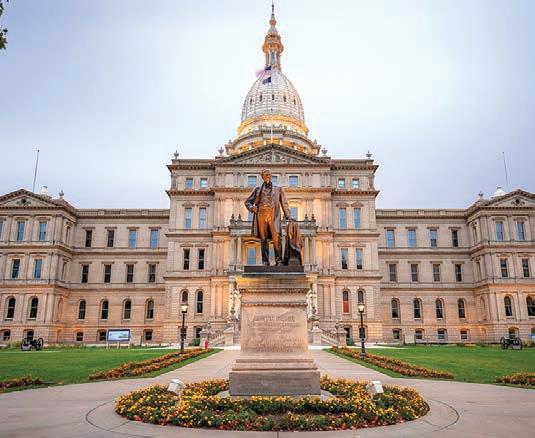
Detroit City Councilman Fred Durhal III, representing District 7, where Eastern Market resides, told the Michigan Chronicle, “It’s still very early in the process, MDOT is
litically performative. House Speaker Matt Hall characterized it as “not constitutionally coherent” and an unnecessary restriction on presidential authority.
Responding swiftly to the surge in violence, DPD adjusted its deployment plans. Rather than waiting for mid-summer, they deployed officers in the spring itself
The rise in visitors to the Greektown area is evident in data from Placer.ai, a location analytics company specializing in visit trends and demographic insights through geolocation-enabled mobile devices. From May 1-Aug. 27, 2022, there were 1.3 million visits and 655,000 visitors to Greektown, according to Placer.ai. In the same period this year, these numbers increased to 1.4 million visits and 670,000 visitors.
because of discrimination, but they were also coming because Black people was doing some stuff. When did Black people start doing things in the
But by reframing the conversation, lawmakers aren’t merely reacting—they’re asserting control. The measure declares that Michigan won’t be complicit in military missions masquerading as law enforcement, especially when historical memory offers a warning.
Notably, Detroit has witnessed a consistent decrease in recent years, with the number of unhoused residents steadily declining. In 2019, approximately 7,847 people were unhoused and entered the City’s community response system. In 2021, about 5,687 people experienced homelessness.
cising constitutional rights is deeply concerning. We’re not pretending our bill will stop an illegal deployment—but it arms courts with tools.”
According to the City of Detroit, since the start of the fiscal year 2019 to 2021, Detroit saw a 28% decrease in the
Detroiters are reclaiming their place in the city, despite the challenges posed by gentrification.
During the Great Migration, thousands of Black families from the South came to Detroit in search of jobs in the booming automobile industry. Despite facing discrimination and segregation, they built vibrant communities on the
In Washington, D.C., President Trump invoked Section 740 of the Home Rule Act on August 11, 2025—federalizing the capital’s police and unleashing about 800 National Guard troops alongside federal agents, just as violent crime sits at a 30-year low.
Across the country in California, more than 4,000 National Guard troops and 700 U.S. Marines mobilized in response to immigration raids and ensuing protests. Legal challenges followed—Newsom v. Trump now squares off in court over whether such federal deployments trample the Posse Comitatus Act or the Constitution.
Rep. Laurie Pohutsky (D-Livonia), a lead sponsor of HB 4976, emphasized the stakes: “The authoritarian activation of troops against citizens exer-
As Detroit’s downtown area continues to attract both residents and visitors, the police department has implemented various enforcement measures to manage the increased population. Notably, metal detectors have been strategically placed throughout Greektown to deter the illegal carrying of firearms.
“We have strategically placed them at key points, “ Chief White explains. It has been a deterrent for some, and some have tested it. If you are legally carrying a weapon and carrying a CPL, have a great day. If you’re
The ACLU of Michigan concurs. Legislative Director Kyle Zawacki warned, “Normalizing troops in public spaces is a step toward a militarized police state. We’ll pursue every legal avenue to resist it.”
Critics in the GOP-majority, however, dismiss the move as redundant—or worse, po-
Recall Detroit, 1967. The National Guard—and federal troops—entered the city amid racial unrest. Residents remember Kelly green uniforms patrolling their streets and the lasting trauma of suppression. Those images of militarized force becoming normal shaped decades of mistrust between communities and uniformed authority.
Across the nation, civil rights movements have bristled under states of siege. Federal troops in Little Rock in 1957, Chicago in 1968, and Atlanta in 1970 reminded once again: ground forces at home
women been premoment of the final. a law1931 law effect, asked the affirm that constitucontain abortion. Our Planned Advocates of founding coalition ReproducAll, a affirm abortion and freedom in constitution,” Giroux. is that everything in aborMichigan, makes we will we can patients care they
to have representalegislacollection and criminal jusrecomcollection analywith the AttorMichigan Law Standards Association Prosecutors stakeholders collect and strategically. warHouse Operations hearand other would ban of noknock urging the pass reform and Whitmer to the leg-
embraces. transforleadership as a approach that change the syscircumstancoperating Ivory “Transformationdoesn’t just do certhem view of and exdrive that because what create everyentire because
From page A-1 don’t preserve order—they project dominance.
cine and healthcare, may be adversely impacted by the decision to overturn Roe v. Wade. “What we are really concerned about is the impact on our patients.
Those memories inform today’s concerns. If Michigan allowed unchecked federal deployments, Detroit or Flint could mirror those flashpoints—courts would be the only avenue of resistance.
Elected officials are also working to keep Roe v. Wade intact thus holding off Michigan’s 1931 trigger ban. Governor Gretchen Whitmer released a statement saying, in part:
Legal scholars underscore this tension. Under the Insurrection Act and Title 10 of federal law, the president can deploy troops during an insurrection or to enforce federal law. But scholars argue that Newsom v. Trump could redefine the boundaries. If California loses control over Guard deployment within its own borders, then other states could see similar actions.
Reuters outlined the mechanics: by following Title 32 status, troops often remain under state control even while receiving federal funding, skirting the Posse Comitatus Act’s limits on domestic military use. That makes Michigan’s move more than symbology—it’s a legal anchor.
“The words ‘Roe overturned’ are no longer theoretical. I want every Michigander to know— no matter what happens in D.C., I’m going to fight like hell to protect access to safe, legal abortion in Michigan…”
The stakes become even more personal for Black and Brown Michiganders. In D.C., ICE checkpoints, arrests, and blockades have created a climate of fear—especially among immigrants. An AP report documented over 630 arrests— including 251 undocumented people—leading to disrupted daycare, empty storefronts, and calculated avoidance of public spaces.
Similarly, California’s militarized response after immi-
By Sam Robinson SENIOR REPORTER
Detroit Mayor Mike Duggan rented out the main hall at Michigan Central for a campaign event featuring more than 100 current and former elected officials from across the state.
More than legal implications, overturning Roe v. Wade would impact several systems across the spectrum. With the potential to drive both foster and adoption numbers upward, a ban on abortions could leave many women to choose a less safe route restoring ‘back alley’ and illegal abortion practices, including self-abortions. Moreover, African American women and women of color, who already have a long-storied history with access and inclusion in medi-
islature adopts it.
On Tuesday, more than 200 sitting and former elected officials from across Michigan endorsed Duggan, who left the Democratic Party last year to run for governor as an independent.
His campaign says it’s the largest coalition of supporters for any gubernatorial candidate yet in the race, made up of Republicans, Democrats, and Independents that represent communities throughout the state.
“Michiganders want a governor whose first priority isn’t protecting their party’s majority. I’m running as an Independent because the only way we can fix our broken education system and create the kind of Michigan where all communities can thrive is by ending the toxic partisanship that’s plaguing Lansing,” Duggan said.
Increase school funding: Statutory changes to increase the School Aid Fund revenue by at least $3.6 billion and establish a permanent weighted funding formula based on student and community needs and universal preschool (0-3).
On stage inside Michigan Central, he was flanked by 200 local lawmakers representing communities from across the state, including former Congressman David Trott, Dearborn Heights Democrat Mo Beydoun, and a
Reject censorship in history instruction: Encouraging Gov. Whitmer to ensure the goal for Michigan schools should be history instruction that is presented by professionals with the subject matter expertise, pedagogical skills, and judgment necessary to present complex information to students that are grounded in provable facts and add to the understanding of modern-day America.
Increase mental health supports for the Black community: Recommending Michigan set a goal of increasing the number of Black mental health service providers by 20% each year over five years.
people believe that they need to for themselves and others to live better lives.”
“Chancellor Ivery is a true transformational leader and an outstanding CEO, who is more than worthy of the CEO of the Year Award he just received, “ said Prof. James C. Mays, who teaches entrepreneurship and supply chain management at WCCCD’s Corporate College. “In his 27 years at WCCCD, Dr. Ivery has elevated WCCCD to become nationally recognized for excellence and innovation and preparing our students professionally and personally to do great things in the world.”
gration enforcement uprooted Black and Latino neighborhoods that were already vulnerable. Locals reported mass arrests, injuries, and destruction of trust. The show of force felt punitive, not protective.
History has taught communities of color that militarized law enforcement isn’t abstract—it’s existential.
Access to abortion is already out of reach for far too many Michiganders, especially Black people and people of color who face additional barriers to care as a result of systemic inequalities and institutional racism. Losing access to legal abortion will impact those communities most, forcing people to become parents or expand their families against their will. Being able to decide and control if, when and how to become a parent is central to building and living a healthy, happy life,” said Vasquez Giroux.
what the Supreme Court will rule in the upcoming days. Despite the decision, advocates on both sides of the argument are willing to continue their pursuits.
HB 4976 places the choice in Michigan’s hands: who oversees public safety, and how? It isn’t about denying federal aid during natural disasters. It’s a constitutional posture, a moral boundary.
Michigan’s civil rights legacy underscores this. The state was home to powerful protests, the first Black mayor of Detroit, and a flashpoint for housing and education inequality. Activists who challenged local and federal overreach across decades would welcome the sentiment: “We control our streets.”
As Newsom v. Trump inches through federal court, Michigan’s bill is both prescient and preventive—a legal flare. It won’t shield against all threats—but it holds space for due process.
In the legislature, HB 4976 stands little chance of passage. In committee, it may gather dust. Yet in communities of color, each word counts. It says that when force replaces dialogue, a door still exists.
Who guards the guard? Who safeguards the governed? For Michigan—particularly Black and Brown residents— the answer matters now. If push comes to shove, courts should have the tools, history should have the bearings, and democracy should have its line in the sand.
Beyond the scope of pro-choice versus prolife, the fight for reproductive choice is one of
“Overturning Roe v. Wade would be a terrible break with nearly 50 years of judicial precedent and – more importantly – a blow against individual freedom. It is my hope that the majority of justices will reject the findings of this draft. If that is not the case, we need to stand with Senate Majority Leader Schumer and Gov. Whitmer in support of their efforts to preserve the right to reproductive freedom,” said Chair Alisha Bell, on behalf of the Wayne County Commission.






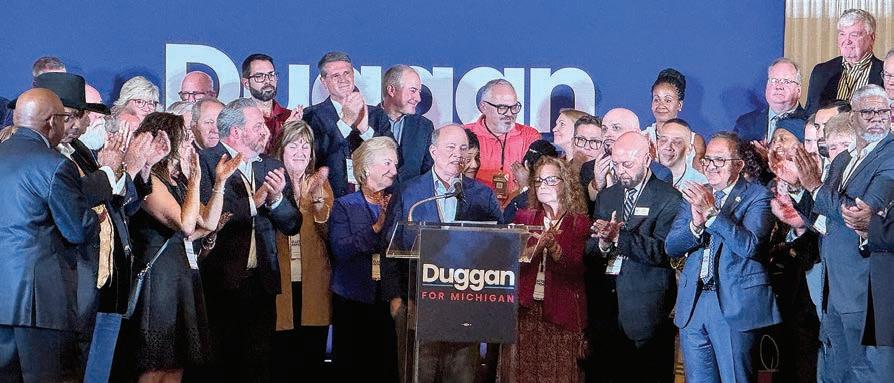
number of Metro Detroit officials.
in obtaining licensure in Michigan. Ensure equitable distribution of state health funds: Ensure all Michigan communities with a significant Black population receive adequate funds to address mental health issues.
“It’s time for Michigan to have leaders who work for everyone, not just their party’s agenda,” said Mark Northrup, Mayor of Hudsonville. “The consequences of partisan gridlock are all around us. Our public schools are underperforming, our roads are riddled with potholes, our economy is stalled and taxpayer money is not being put to best use. We can and must do better for the people of this great state, and I believe Mike Duggan is the leader who will deliver that for Michigan.”
Protecting Black voting rights: Urge state officials to remain vigilant in the fight against schemes to disenfranchise Michiganders of color.
Since launching his Independent campaign, Duggan has drawn support from eight unions representing more than 25,000 members, more than 150 pastors and faith leaders, and the Detroit Re-
“BLAC members have worked hard to identify the needs of the Black community and we feel these recommendations will provide a solid first step towards breaking down barriers in education, community safety, health and business,” said BLAC Co-Chair Dr. Donna L. Bell.
BLAC will hold a virtual town hall meeting to discuss its policy recommendations on Thursday, May 12 at 4 p.m. Join BLAC and a virtual audience in discussing the recommendations to support the Black community.
BLAC is housed in the Michigan Department of Labor and Economic Opportunity. Members represent many professional backgrounds, including economics, law, public safety, health and wellness, arts and culture and media. They leverage their experiences and expertise to make recommendations to the governor on critical issues affecting the Black community.
To learn more about BLAC and this upcoming event, visit www.michigan.gov/BLAC.
gional Chamber, the state’s largest chamber of commerce.
Jason Harvey, a Republican councilman in New Baltimore, told Michigan Chronicle at the event that he’s tired of “the far right and the far left.”
“We need to come together, find common ground and move forward,” he said. “People are sick of the bickering and the fighting back and forth.”
“I don’t think people realize is he’s going to get considerable support from Republicans,” Harvey said.
Michigan Democrats are criticizing Duggan for just that.
“As Mike Duggan is set to hold a campaign event today in Detroit, will any of the Republican
megadonors that are currently funding his campaign be on hand to see how their investment is doing?” Michigan Democratic Party spokesperson Derrick Honeyman said in a statement. Michigan Democratic Party Chair Curtis Hertel speculated about how Duggan’s campaign paid for the event at Ford Motor Company’s new building.
“With Mike Duggan set to hold a very swanky event, will any of his major Republican donors appear with him? Because let’s be honest: the big bucks that Republicans like Ron Weiser and J.C. Huizenga have donated to his campaign are helping pay for this event, so I wouldn’t be surprised if they want to check in on their investment... Whatever Duggan
says, Michiganders shouldn’t trust a single thing from him, as it’s clear he’s been bought and sold by major pro-Trump, anti-labor donors who just want to drag Michigan backwards. When you follow the money on who’s actually behind his campaign, Duggan’s self-serving shtick is exposed pretty quickly.”
The Democratic Party chair pointed to a Metro Times report that found many of Duggan’s donors are also donors of President Donald Trump and conservative leaders.
Ron Weiser, the former Chair of the Michigan Republican Party, his son, and his daughter-in-law each donated $8,325 to Duggan. Weiser also played a pivotal role in passing anti-worker Right to Work laws in Michigan.
Retired occupational therapist Carol Adler and her husband Mark Adler, a filmmaker belonging to the IATSE Local 38, which endorsed Duggan, told Michigan Chronicle they worked on Kamala Harris’ campaign but are supporting Duggan because they are sick of the hyper-partisan nature of politics.
“Benson, Nessel and Whitmer were a dream team, Charlie’s Angel’s, I call them,” Carol said. “But those days are about to be over.” You can reach Sam at srobinson@michronicle.com
power outages and saved customers a total of 2.9 million minutes of downtime by speeding up crew response time and rerouting electricity during repairs in the first seven months of 2025. Integrating smart devices into its electric grid is part of DTE’s commitment to reducing outages by 30% and cutting outage times in half by the end of 2029. The company will be adding more than 100 smart devices to the grid in Detroit, and more than 675 across DTE’s electric service area.
DTE’s commitment to fully automating its electric grid by 2029 promises several benefits for customers:
• Improved safety: Smart grid devices can automatically detect and deenergize downed wires, helping to keep more people safe.
• Fewer outages: Smart devices are designed to isolate areas of damage and rerout power, so the lights stay on while crews make repairs.
• Shorter outages and quicker restoration: Smart devices can quickly identify the location of the damaged equipment, so crews can arrive at the location faster and begin making repairs.
DTE’s smart grid is an interconnected system that includes the company’s Advanced Distribution Management System software, state-of-the-art Systems Operation Center, substation equipment, automated smart devices, smart meters and more. The automated smart devices allow the company to remotely monitor, operate and control the grid across the communities that DTE serves, minimizing service interruptions for customers.
Transitioning to a smart grid is just one part of DTE’s plan to build the grid of the future. The company is also upgrading existing infrastructure, rebuilding significant portions of the grid and trimming or removing trees to enhance reliability and safety.

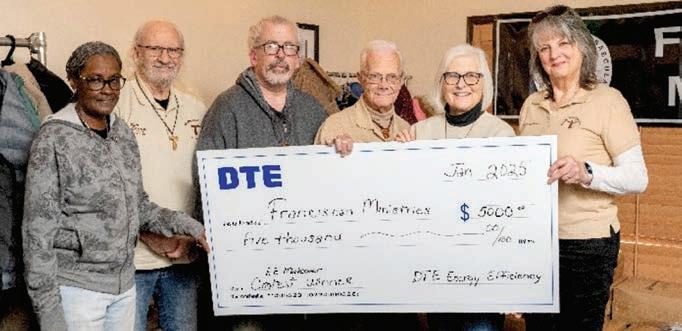
DTE Energy is looking for three small businesses who can use $5,000 on energy efficiency improvements. The company’s annual Energy Efficiency Makeover Contest kicks off Aug. 20 and runs till midnight on Oct. 8, 2025.
Over the last 10 years, DTE has supported companies across the state of all sizes and types, from a small family dairy, a cosmetic company, a confectioner, a fitness gym and multiple non-profit organizations.
“Each year this contest receives more and more entries, which tells us there is a strong interest in energy efficiency.”
Read on to see how a few of last year’s winners used their prize money to save energy and improve their business.
The Detroit-based Franciscan Ministries is an 11-year-old nonprofit run by a small team of volunteers. Its 4,000-square-foot building is modest, but its energy expenses were not, says Michael Carsten, the board chairman.
A DTE energy advisor recommended interior/exterior security lighting upgrades and the installation of digital HVAC controls. Carsten says the changes have helped keep the building comfortable when people are there and efficient when they are not.
“Any penny that I can save in one place frees up dollars to continue giving back to our neighbors,” he says.
As temperatures climb during the summer, you might notice your energy bill creeping higher as you work to keep your home cool and comfortable. Running your air conditioner, using appliances and even small energy leaks can add up, leading to higher bills.

The contest is open to all businesses that are current DTE electric, gas or gas/electric combo customers.
“Small businesses are the foundation of the communities where we live and serve, and we are proud to support these businesses in making improvements that reduce their energy use, which benefits both the business and the community,” said Carmen Welch, director of energy efficiency, DTE Energy.
Five finalists will receive a free energy assessment, and three grand-prize winners will each win a $5,000 grant, recommendations for energy efficiency upgrades and an opportunity to be featured in DTE’s EnergySmarts For Michigan Business magazine.
Michigan League for Crippled Children’s Camp Grace Bentely is an 8-acre camp built in 1928 on the shore of Lake Huron. It’s a place where kids and adults with disabilities create a lifetime of memories and develop a greater sense of independence through new adventures. With their $5,000 winnings, the camp was able to add energy-efficient LED lighting throughout the camp buildings and air conditioning to some of the camp’s main buildings.
Don’t miss this opportunity to improve your business with help from DTE. Enter the Energy Efficiency Makeover Contest today at dteenergy.com/makeover.
Need for support up 72% from the last program year due to extreme temperatures, more resources are needed for Michigan residents
DTE Energy is stepping up to help families across Michigan struggling to stay cool during the extreme summer heat. The company announced an $800,000 donation to United Way for Southeastern Michigan to help Michiganders across the state stay safe during Michigan’s extreme summer weather. The donation will provide relief to elderly, unemployed, underemployed, and disabled customers across Michigan who are struggling to pay their energy bills and have qualified for energy assistance in the current year.
“Many Michigan families face genuine financial hardships and are struggling to pay their bills. This donation will help us support Michiganders accessing the help they need to pay their energy bills,” said Jeff Miles, vice president of Community Impact, United Way for Southeastern Michigan. “While MEAP recently expanded assistance amounts and eligibility requirements, this donation helps address current gaps and keep families enrolled now.”
“DTE’s strong partnership with United Way of more than 40 years continues to be a lifeline for Michigan families – especially in the summer, when rising temperatures can lead to unexpected energy costs,” said Evette Griffie, vice president of Customer and Community Engagement, DTE. “This donation isn’t just about meeting the needs of today, it connects families to the right programs that can prevent these crises in the future.”

According to United Way, the need for support has increased 72% from the last program year, resulting in a funding shortfall. This donation will provide immediate support to bridge that gap. At the end of last year, thanks to the advocacy of organizations like United Way and a coalition of other human service nonprofits, the Michigan legislature passed an energy assistance expansion which Governor Whitmer signed into law. The new law increases the funding available for low-income families under the Michigan Energy Assistance Program (MEAP) and modifies the eligibility criteria to allow it to serve more of those in need. This additional funding will be available for new applicants on October 1, at the beginning of the State’s fiscal year. Until then, the new dollars being invested by United Way and DTE will help fill
More than 5,000 residents were enrolled in LSP during the 20242025 program year, and DTE anticipates potentially greater need through the remainder of this year. This donation is expected to support 6,400 customers this program year. Visit unitedwaysem.org/utility-assistance for more information about the program or to enroll.
“We’re grateful for this critical support from our partners at DTE, which will allow us to help families not just get through tough times, but stay on solid ground,” added Miles. “As household budgets are seeing increased pressure, we will continue to work with community partners to help more families move from crisis to stability and from stability to prosperity.”
Over the past five years, DTE has connected customers to more than $660 million in financial aid. The company works closely with federal, state and agency partners to advocate for new approaches to quickly get help to customers in need. DTE also served as a strong advocate for the recently passed legislation that will increase funding for energy assistance and reduce access barriers, opening the doors of support to additional Michiganders in need.
“DTE works every day to connect customers to energy assistance – we are doing everything in our power to ensure customers are never without the energy they need. Our work doesn’t end here. We will continue to advocate for the most vulnerable so they can receive the support and resources they deserve,” said Griffie.
Customers can learn more about financial assistance programs at dteenergy.com/help.
•
• Cash in with a DTE rebate that will help lower your energy use and bill at dteenergy.com/insulation. Now that your home’s envelope is sealed, make sure your equipment is working properly.
Did you know half of your energy bill comes from cooling your home?
• It’s important to change your air filter regularly: A dirty filter will slow air flow and make the system work harder to keep you cool – wasting energy. A clean filter will also prevent dust and dirt from building up in the system – leading to expensive maintenance.
• Make sure the top of your AC unit is clear of clutter and debris to prevent anything from blocking the airflow.
• Keep up to date with maintenance on your system by scheduling an AC tune-up. You could qualify for our rebates, helping you save on costs while also reducing your energy use. Visit dteenergy.com/ac
We often hear of thermostat wars; they’re a real
•
By A. Scott Bolden
CONTRIBUTOR
President Donald Trump sounded like a 19th-century European colonialist justifying the subjugation of “savage natives” in “darkest Africa” when he recently ordered a federal takeover of the police force in Washington, D.C, and deployed 800 National Guard troops in the city.
This followed Trump’s order assigning 500 federal law enforcement officers — including FBI agents who should be protecting the nation against major threats — to combat D.C. street crime.
Black people make up the largest racial group in Washington — about 43 percent — and the city’s mayor, police chief and non-voting delegate to the U.S. House of Representatives are all Black. The president seems to believe they are incapable of fighting crime.
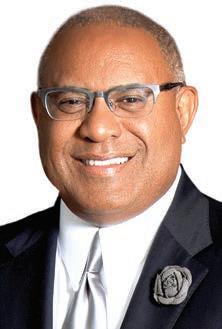
Trump falsely claimed in an Aug. 11 news conference that D.C. “has been overtaken by violent gangs and bloodthirsty criminals, roving mobs of wild youth, drugged out maniacs and homeless people.” Not coincidentally, Trump used his news conference to also attack other cities run by Black mayors: Baltimore, Chicago, Los Angeles, New York and Oakland.
I’ve lived in Washington for decades. It is a beautiful city, drawing visitors for safe and enjoyable trips from around the world — not the nightmarish hellhole Trump described. We have some of the world’s finest museums, monuments, parks, neighborhoods, and public spaces.
Trump notably failed to mention that crime in Washington fell 35 percent to its lowest level in 30 years in 202,4, and violent crime has plummeted an additional 26 percent so far this year. Some people may not feel safe in Washington, but the significant drop in crime in the capital city hardly qualifies as the “public safety emergency” Trump said existed.
Alarmingly, Trump said that under his orders, police “are allowed to do whatever the hell they want.” What does that mean?
Does the president claim police can violate the constitutional rights of anyone and break any laws they want in their zeal to somehow reduce crime? Is he giving himself the power to allow police to beat or even kill suspected criminals without accountability? Under Trump’s order, will we see more Black people murdered by police, as George Floyd was in Minneapolis in 2020?
Trump has no power to violate the Constitution and laws, no matter how much he wishes he did.
The president’s action overriding the powers of the local government in D.C. constitutes a brazen power grab and a desperate publicity stunt designed to distract attention from his years-long friendship with convicted sex offender Jeffrey Epstein. He also wants to portray himself falsely — the first convicted felon to serve as president — as a tough-on-crime supporter of police.
The truth is that Trump is the best friend criminals have — as long as they break the law in support of him. He proved this by pardoning about 1,500 people — most of them white — accused or already convicted of crimes in the Jan. 6, 2021, Capitol riot that was designed to keep him in power after he was defeated in the 2020 presidential election. Rioters violently attacked and injured about 140 police officers, including five officers who later died.
Washington already has more police officers per capita than any state or large U.S. city. Turning over the police department to federal officials without local knowledge and no hands-on policing experience — assisted by National Guardsmen without law enforcement training — won’t improve the police department’s performance. It will make things worse.
A better way to help D.C. strengthen its police department would be for the U.S. House to approve legislation allowing the city government to spend $1 billion of its local tax dollars on police and other programs this year. Unfortunately, the Republican-controlled House has failed to approve legislation to do this by correcting a mistake in a federal spending bill.
Reducing crime requires more than putting police on the streets and making arrests. It requires a series of policies to prevent crimes, not just respond to them.
More federal funding for private-public partnerships with local businesses and houses of worship can create alternative paths for young people to help them stay out of trouble, graduate from high school, and go on to job training, college, or careers. Programs like these are far cheaper than tracking down and imprisoning criminals, and are more effective at protecting public safety.
Mayor Muriel Bowser said the federal government could do more to reduce crime if it funded more prosecutors in the district and filled the 15 vacancies on the D.C. Superior Court, including some that have gone unfilled for years.
Because the District of Columbia is not a state, the president and Congress have greater power to exercise control than they do over the 50 states. Trump recently said he has asked lawyers to study congressional repeal of the 1973 D.C. Home Rule Act, which gave residents of the capital limited self-government and the right to elect a mayor and city council. Before the act’s passage, the president appointed commissioners who ran local government like colonial overseers.
Increased federal control of Washington is the exact opposite course the president should follow. Rather than denouncing and demonizing city officials as adversaries and falsely portraying Washington, he ought to work with city leaders as allies to reduce crime, homelessness, and other problems that affect all big cities.
The 700,000 residents of the capital are as entitled to self-government as other Americans are and will hopefully eventually achieve statehood. We do not need to be occupied by the National Guard and a federalized police force as if we were an enemy nation conquered in war.
Having the federal government increase its control of D.C. local affairs is a mistake that the president should reconsider, and Congress should halt if he refuses.
A. Scott Bolden is an attorney, NewsNation contributor, former chair of the Washington, D.C. Democratic Party and a former New York state prosecutor.

By Ebony JJ Curry SENIOR REPORTER
State Superintendent Michael Rice says the Michigan House and Senate’s failure to pass a budget is more than a political standoff — it’s a looming disruption for classrooms, cafeterias, and communities. More than 40 days have passed since the July 1 deadline required by state law, which carries no penalty for lawmakers. Rice says the lack of consequences is part of the problem and is urging legislative leaders to resolve their differences before the start of the new school year, calling the delay “unacceptable” and a direct threat to the state’s progress on school funding equity.
“It’s unacceptable that the state Legislature can flout state law because it’s the state Legislature and presumably there are no consequences,” Rice said. “Local school leaders are going to be risk averse, they’re going to be especially cautious, and that will lead to staffing on the margins. So the Legislature needs to pass a budget. The budget needs to be a reasonable budget that continues our progress towards adequate and equitable school funding.”
The impasse between the Republican-controlled House and the Democratic-controlled Senate has left districts across Michigan unsure how much funding they’ll have when classes begin. In the absence of a budget, school leaders are weighing difficult decisions on hiring, programming, and student support services. The uncertainty is already altering plans for the year ahead — in some places, before students have even stepped into the building.
One of the biggest flashpoints is the state’s universal school meals program. Michigan began funding free breakfast and lunch for all public school students, regardless of family income, during the 2023-24 school year. The program is supplemented by federal dollars through the U.S. Department of Agriculture’s Community Eligibility Provision, but the state portion of the funding runs out Sept. 30. The Democratic-led Senate passed an education budget in May that preserves the free meals program. The House budget, advanced by Republicans, omits it entirely.
Republicans argue their plan supports schools by increasing the per-pupil foundation allowance by $400, from $9,608 to $10,008, while giving local districts the flexibility to decide whether to fund meals or other programs. Their budget also calls for cuts to transportation funding for rural districts, mental health services, and school safety programs — changes they say will help control costs. Demo-

crats counter that removing dedicated funding for these programs will harm children, particularly in low-income and rural communities.
The uncertainty has already triggered changes in at least one district.
Okemos Public Schools notified parents last week that it will no longer provide free meals to all students, reverting to the previous income-based eligibility for free or reduced-price lunches. Students who don’t meet the federal guidelines will be required to pay for their meals.
Rice says that decision was premature because the program is fully funded through Oct. 1, and he’s urging other districts not to follow suit. In a memo to school leaders last week, he wrote that “MDE strongly recommends that local districts offer free meals at the beginning of this school year to take advantage of the student health, attendance, and performance benefits of school meals.”
He also emphasized that the U.S. Department of Agriculture has made it clear districts cannot reverse a decision to opt out of the program midyear.
“The department cautions districts from making too quick a decision regarding participation in the meals program because the Agriculture Department has made it clear that if a district changes its participation, those changes cannot be reversed within the same school year,” Rice wrote.
The Okemos decision has fueled more political finger-pointing, with Republicans blaming Democrats for insisting on program-specific spending and Democrats accusing Republicans of jeopardizing students’ nutrition. But Rice’s focus is on keeping the program intact until lawmakers finalize a budget. “The budget needs to be a reasonable budget that continues our progress towards adequate and equitable school funding,” he reiterated.
Beyond school meals, Rice says the lack of a budget creates ripple effects that touch nearly every part of school operations. Hiring decisions are the most immediate concern. Salaries and staffing represent the largest portion of school budgets, and without knowing how much money they’ll have, district leaders tend to hold off on filling positions. That hesitation, Rice warns, will likely lead to fewer teachers in classrooms, larger class sizes, and reduced access to specialized staff like counselors, reading specialists, and paraprofessionals.
“When you don’t know what your revenues are going to be, you’re not going to be as aggressive in hiring as you otherwise would,” he said. “And that’s going to have an impact.”
The uncertainty also affects contracts for curriculum, extracurricular
activities, and student support services. Many districts finalize these agreements during the summer to be ready for the first day of school. Without a clear budget, those plans are delayed or scaled back, leaving students and families without clarity on what the school year will offer.
The political divide in Lansing is part of a larger struggle over the role of state funding in public education. While both chambers say they want to support Michigan schools, their visions differ on how to allocate resources. Democrats have pushed for targeted investments in programs they say level the playing field for disadvantaged students, including universal meals, transportation aid for rural communities, and mental health resources. Republicans have argued for more flexibility at the local level, paired with across-the-board increases to per-pupil funding.
For school leaders, the debate in Lansing is less about ideology and more about predictability. Without a budget in place, they can’t lock in staffing, launch programs, or assure families that key supports will be available. The free meals program is a prime example: districts that drop it now, only to see it restored in the final budget, will have lost months of participation and disrupted a service that many families rely on daily.
Rice has been clear that feeding students should not be treated as a bargaining chip.
The delay comes at a time when Michigan schools are still working to recover from pandemic-era disruptions and the expiration of federal COVID-relief funds. Those one-time dollars allowed districts to expand tutoring, hire additional support staff, and invest in technology upgrades. With that funding winding down, state dollars will be critical to sustaining many of those efforts.
For districts already facing declining enrollment or rising operational costs, the uncertainty compounds existing challenges. Some administrators are concerned that if the budget stalemate drags into the fall, they may have to make cuts that will be difficult to reverse later in the school year.
Rice’s warning is blunt: the longer Lansing waits, the more harm is done to Michigan’s students.
Whether lawmakers can reach an agreement before students return to class remains uncertain. But as the first day of school approaches, the stakes are clear — without a budget, Michigan’s classrooms and cafeterias will start the year under a cloud of uncertainty, and students will bear the weight of decisions made far from their desks.



A5 | Aug. 27 - Sept. 2, 2025
The average 30-year fixed mortgage rate has dipped to around 6.5%, the lowest level we’ve seen in months. For many, that number may feel like just another headline until we take the time to break down what it really means. For African American homeowners and aspiring buyers, understanding how to interpret mortgage rates and knowing when to act can make the difference between being stretched thin and building lasting wealth.
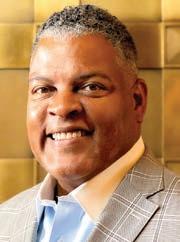
A rate of 6.5% may sound high compared to the historic lows we saw during the pandemic, but it is a meaningful improvement from the 7%–7.5% rates many homeowners locked into just last year. On a $250,000 mortgage, a drop from 7.25% to 6.5% saves nearly $120 a month. That’s money that can be redirected into paying down other debts, building savings, or investing. For families managing tight budgets, that kind of breathing room can be transformative.
So when should you consider refinancing? The rule of thumb is simple if you can lower your rate by at least 0.5% to 1% and plan to stay in your home for more than a few years, it’s worth looking into. But refinancing isn’t just about chasing a lower payment, it can also be about using your home’s equity to achieve other financial goals. Many Black homeowners today sit on significant untapped equity because of the rapid home price appreciation of the past five years. A refinance can allow you to access some of that equity to consolidate higher-interest debt, fund home improvements, or even invest in additional property. Done strategically, it turns a home into a wealth-building tool, not just a place to live.
Comparing rates is also crucial. Lenders may advertise similar averages, but small differences in fees, points, and loan structures can add up to thousands of dollars over time. It’s not enough to accept the first offer, shopping around and securing at least three quotes is one of the most powerful ways to save. Studies show that borrowers who compare rates can save tens of thousands over the life of a loan, yet too many skip this step, especially in the Black community where access and trust in the lending system have historically been eroded.
Another consideration is whether to prioritize refinancing or paying down debt faster. If your interest rate is relatively high compared to the new market average, refinancing makes sense. But if you already have a competitive rate, say in the low 6s you might be better off applying extra funds to principal payments instead. Every additional payment you make toward the principal reduces the amount of interest you’ll owe in the long run and accelerates your path to full ownership. Imagine the difference between paying off your mortgage in 30 years versus 22 years, that’s eight extra years of freedom and thousands in interest savings.
For the African American community, where the homeownership gap remains over 20 percentage points compared to White households, moments like this

By Ebony JJ Curry SENIOR REPORTER
Flint has been forced to endure a decade of crises that tested the survival of its families and its businesses. From the water crisis to waves of economic disinvestment, the city has been treated as an afterthought in conversations about Michigan’s future. Yet this month, Flint was chosen as the first city outside Detroit to host the Michigan Black Business Alliance’s Capital Connect program. The decision signals a statewide recognition that Black entrepreneurs in Flint—and cities like it—deserve the same tools, resources, and access to capital that have too often been bypassed.
The graduation of Capital Connect Cohort 13 brought eight Flint entrepreneurs together as the first group outside Detroit to complete the 12-week accelerator. In Detroit, the program has already helped business owners secure more than $6.5 million over the past three years. With Flint now included, MBBA expects to push that figure past $7 million. For a city home to more than 1,800 Black-owned businesses, the expansion sends a clear signal: Flint’s entrepreneurs are part of Michigan’s economic future, and closing the racial wealth gap will depend on their growth.
Charity Dean, MBBA’s president and CEO, called the milestone proof of a model that can be replicated across the state. “With the success of our first Capital Connect cohort in Flint, we’re proving that our model works beyond Detroit,” she said. “This is part of our broader vision to ensure that Black business owners across Michigan, not just in major cities, can access the capital and coaching they need to grow and scale.”
Flint has more than 1,800 Black-owned businesses, yet far too many remain shut out of traditional capital markets. Studies show that Black business owners are denied loans at twice the rate of their white counterparts. When they do receive financing, it is often at higher interest rates and with less favorable terms. Nationally, Black founders have received less than two percent of venture capital in the past decade. For Flint entrepreneurs, the barrier has been compounded by years of systemic neglect. That is why a program like Capital Connect arriving in the city matters: it places Flint into Michigan’s broader economic recovery conversation, not as a charity case but as a hub of talent and innovation worthy of investment.
Cohort 13’s graduating businesses reflect both Flint’s creativity and its resilience. They include culinary ventures like The Poke Bowl, Paw Paw’s Pickles, and Lord Laird’s Premium Lemonade; fashion and branding outfits like King’s Klutches and Prestige Promotions; community-focused services like Marsh Personal Protection Service and Drinks of Essence Bartending School; and cultural leaders like TC McClain Enterprises. Each business entered the program with ambition but often without access to the kind of technical assistance and lender connections that can make or break growth. They left with
Gilbert Family Foundation Invests $4M to Boost Black-Led Businesses and Developers in Detroit
By Jeremy Allen EXECUTIVE EDITOR
The Gilbert Family Foundation is making a bold statement in Detroit’s commitment to economic equity with an investment of $4 million aimed at strengthening Black-led businesses and community developers. Announced during National Black Business Month, this new funding reflects the foundation’s ongoing commitment to addressing disparities and empowering entrepreneurs within the city, especially those in historically underserved communities. The $4 million will be split between two vital organizations in Detroit’s Black business ecosystem: Black Leaders Detroit (BLD) and the Michigan Black Business Alliance (MBBA). BLD will receive $2.1 million while MBBA will benefit from $2 million, both to expand and enhance their efforts to foster a more inclusive and sustainable business environment. For the Gilbert
Family Foundation, these investments are a natural extension of its larger mission to create economic opportunities for all Detroiters, particularly those who have been historically excluded from the economic mainstream.
Darnell Adams, Vice President of Detroit Community Initiatives at the foundation, made it clear that small businesses will play a central role in the city’s future growth. “Detroit’s continued growth hinges on a strong small business community throughout the city,” Adams remarked. “These investments will ensure Detroit developers, entrepreneurs, and small businesses have the resources and opportunities needed to shape the future of our city and state.”
This new infusion of funds follows a broader commitment of $500 million over 10 years, which the Gilbert Family Foundation first announced in partnership with Rocket Community Fund in 2021. The foundation has already deployed over $232 million, with the aim
fundable loan packages, approved financial projections, and a seat at the table during Funder Night, where lenders ranging from Huntington Bank to First Independence Bank reviewed their plans.
For many of these entrepreneurs, this was the first time their ideas were formally vetted in financial rooms that have historically closed their doors to Black business owners. That access is one of Capital Connect’s most powerful offerings—not just the training, but the normalization that Black-owned businesses are viable, fundable, and essential to Michigan’s economy.
The choice of Flint was no accident. It was made possible through partnerships with organizations already embedded in the city’s fabric. 100K Ideas, an innovation hub based downtown, served as an anchor partner. Kesten Coulter, the space manager there, said the collaboration with MBBA multiplies the impact of what is already on the ground. “This partnership is important because it allows us to offer even more resources and opportunities to the community we support,” he said. “Every little thing we have going on has value, and with MBBA and other ecosystem partners, that value is multiplied.”
The African American Advisory Committee of Genesee County, co-chaired by business owner La’Asia Johnson, also played a critical role. Johnson, who runs Elle Jae Essentials, emphasized the importance of Flint’s inclusion. “To see the opportunities that MBBA has offered in Detroit now brought to Flint is an amazing expansion for Black and Brown businesses,” she said. “It shows them what’s possible, not only in our community, but across the state.” Johnson added that the significance of the expansion is heightened by the city’s history of struggle. “After everything Flint has endured—from the water crisis to economic challenges, our businesses deserve equitable access to the resources they qualify for.”
The larger significance of Flint’s cohort lies in what it says about the state’s commitment—or lack thereof—to economic equity. While Michigan leaders often tout growth and recovery, data paint a stark picture. Black households in Michigan hold a fraction of the wealth of white households. Black-owned businesses are less likely to survive beyond the five-year mark, in large part due to undercapitalization. Programs like Capital Connect cannot erase these structural disparities overnight, but they can chip away at them by directly linking entrepreneurs to capital providers and equipping them with tools to navigate financial systems that were not built with them in mind.
The fact that Flint entrepreneurs are now in this pipeline is significant for another reason: it challenges the narrative that statewide innovation and growth are confined to Detroit, Grand Rapids, or Ann Arbor. Flint has long been written off in policy conversations, treated as a cautionary tale instead of an investment priority. By expanding here, MBBA is helping to

shift that framing—Flint is not just surviving, it is creating, innovating, and demanding a fair stake in Michigan’s economic future.
For the graduates of Cohort 13, the journey does not end with Funder Night. Each carries the weight of proving what can happen when access and equity align. Their success will not only shape their own livelihoods but also ripple into job creation, community investment, and cultural pride. For Flint’s young people watching, it is a reminder that entrepreneurship is not reserved for outsiders; it is alive in their own neighborhoods.
The work ahead is steep. Systemic inequities in lending, wealth accumulation, and infrastructure will not be erased by one cohort or one program. But Flint’s milestone is a proof point. It shows that intentional, community-driven solutions can open doors where barriers have stood for generations. It also places pressure on policymakers, banks, and civic leaders to scale these efforts, not stall them. If equity is the goal, Flint cannot be the exception—it must be the model.
As MBBA looks to expand Capital Connect into other Michigan cities, Flint’s experience offers both hope and a challenge. Hope, because it demonstrates that with the right partnerships, training, and capital connections, Black businesses can thrive even in places long written off. A challenge, because it raises the question of whether the state is ready to fully commit to dismantling the racial wealth gap or whether this will remain the work of community organizations alone.
For Flint, the graduation of Cohort 13 was an affirmation that the city’s entrepreneurs belong at the center of Michigan’s economic strategy. It was a reminder that equity is not abstract—it is access to loans, to coaching, to networks, and to the belief that Black businesses deserve to grow. And it was a promise, carried forward by eight entrepreneurs, that Flint’s story is still being written—this time not as a tale of crisis, but of possibility.
matter. Rates at 6.5% may not seem like a dream scenario, but compared to the uncertainty of last year, they present a window of opportunity to act strategically. Refinancing to save money, leveraging equity to reinvest, or using disciplined payments to shorten your loan term, all of these are moves that strengthen financial stability and build generational wealth.
Property is Power! but only when we understand how to make the system work for us. The current rate environment is not perfect, but it is workable. Now is the time to evaluate your mortgage, compare your options, and make decisions that put your family on a stronger financial foundation. Because every dollar saved, every payment accelerated, and every refinance completed with intention is not just a financial move, it’s a step toward closing the wealth gap and using the power of ownership.
Property is Power! is a movement to promote home and community ownership. Studies indicate homeownership leads to higher graduation rates, family wealth, and community involvement.
of transforming Detroit into a city of opportunity for its residents.
A significant portion of the $4 million will go towards expanding The Building Fund—an initiative by BLD that provides no-interest loans to community developers working on residential projects across Detroit. With an additional $2.1 million, BLD plans to scale the fund, enabling more developers of African descent to access financial resources and complete much-needed projects in the city. For developers who often face systemic barriers to funding, this program is crucial in leveling the playing field and offering an equitable chance at growth.
“The Building Fund is a game-changer for Detroit,” said Sharea Ayers, Chief Operating Officer of Black Leaders Detroit. “By providing no-interest loans to developers of African descent, we’re not just financing projects—we’re building generational wealth, strengthening neighborhoods, and ensuring that Detroit’s growth includes people who have always called it home.”
The expanded fund will empower developers to revitalize homes, construct new housing, and improve commercial spaces, all with the aim of creating lasting value for the city’s residents. By focusing on Black developers, BLD aims to build community-driven solutions that ensure Detroit’s growth benefits those who have lived through the city’s most challenging times. In addition to its lending programs, BLD will host a business symposium in October that will bring together entrepreneurs for workshops, mentorship, and networking opportunities. This event aims to equip business owners with the tools
they need to succeed in an ever-evolving market.
At the same time, the Michigan Black Business Alliance (MBBA) will use its $2 million to support multiple initiatives aimed at strengthening and scaling Black businesses across the state. MBBA will focus on enhancing its Global Growth Accelerator, a program designed to help at least 40 second-stage businesses grow into sustainable, scalable enterprises. These are businesses that have already surpassed the startup phase but need access to the tools, capital, and mentorship required to expand their operations further. In addition, the Capital Connect initiative will continue to assist businesses at any stage in their journey by connecting them to the right sources of capital, while the BizWiz program will offer one-on-one coaching and technical assistance to entrepreneurs seeking to refine their strategies.
“This generous grant from the Gilbert Family Foundation is more than just funding; it’s a belief in the ingenuity and resilience of our entrepreneurs,” said Charity Dean, President and CEO of MBBA. “This investment will be the spark that helps business owners— especially our second-stage entrepreneurs—turn their dreams into sustainable, thriving realities.”
With a focus on second-stage businesses, MBBA aims to create a bridge for these companies to scale beyond their current constraints. The Global Growth Accelerator will provide the kind of hands-on support that businesses need to refine their operations and find pathways to expansion, while Capital Connect is designed to eliminate the often-significant barriers to accessing funding for businesses of color. The

overall goal is to create a dynamic ecosystem where Black-owned businesses not only survive but thrive, becoming key contributors to Detroit’s broader economic revival.
These new investments reflect a continued, long-term commitment to Detroit. Both BLD and MBBA have already benefitted from previous support in the form of $1 million in grants from the Gilbert Family Foundation in 2023, a portion of the larger effort to revitalize and strengthen Detroit’s neighborhoods. The Gilbert Family Foundation, working in collaboration with local organizations and entrepreneurs, is putting its money toward creating tangible change that will last for generations. These initiatives will help ensure that as Detroit grows, it grows in a way that is equitable, inclusive, and beneficial to all its residents, especially those who have been historically underserved.
“We’re looking at the long term,” said Adams. “These investments represent a piece of the bigger puzzle. Together with our partners, we’re working to create a stronger, more resilient Detroit that works for everyone.”
As Detroit moves forward, the foundation’s investments in Black businesses and developers will lay the groundwork for a more equitable city, where entrepreneurs have the tools and resources to not only succeed but to shape the city in their own image. The road ahead is long, but with continued support from organizations like the Gilbert Family Foundation, Black Leaders Detroit, and the Michigan Black Business Alliance, Detroit is positioned for a future where everyone has the opportunity to build wealth and create lasting impact.
For more information, visit blackleadersdetroit.org or michiganblackbusinessalliance.org.
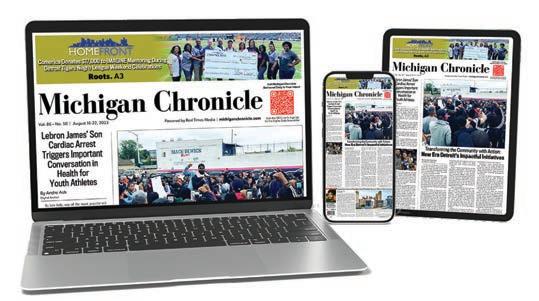


By Ebony JJ Curry SENIOR REPORTER
Governor Gretchen Whitmer signed an executive directive ordering the Michigan Department of Insurance and Financial Services (DIFS) to help residents afford health coverage as the state braces for the fallout from a Republican-backed federal budget bill. The move comes as premiums are set to rise and eligibility requirements tighten, threatening to strip coverage from hundreds of thousands of Michiganders.
“The Republican budget bill will raise the price of health insurance, forcing American families to lose out on thousands of dollars every single year,” Whitmer said. “While I can’t control healthcare policy at the national level, I’m doing what I can to ease the burden on Michigan families. That’s why I’ve asked DIFS to inform Michiganders of their options when enrolling in the Marketplace and answer any questions they may have. I’m grateful to DIFS for working with my administration to make sure Michiganders can keep or get insurance that won’t break the bank. I’ll keep working with anyone to protect access to quality, affordable health care for every Michigander.”
Lieutenant Governor Garlin Gilchrist said the consequences will be felt in everyday households. “The Republican budget bill will raise costs for families and cause hundreds of thousands of Michiganders to lose their health insurance,” he said. “This isn’t abstract. Its impacts will show up in skipped prescriptions and tough conversations about how to afford a doctor visit. We must stand firm against any efforts to undermine Michiganders’ access to quality, affordable health care. Today, we’re asking DIFS to help Michiganders find health insurance and understand their options. Governor Whitmer and I will keep fighting hard and Standing Tall so every Michigander has a path to health, wealth, and prosperity.”
The governor’s directive instructs DIFS to raise awareness during Open Enrollment, operate helplines to answer questions, and connect families with Health Insurance Navigators. The agency will be tasked with helping residents navigate new federal requirements that add paperwork hurdles and shorten enrollment windows, making it easier for people to lose coverage. These changes hit Detroit especially hard. Nearly 80 percent of Detroiters are enrolled in public health insurance programs, and thousands rely on Marketplace plans to bridge the gap when they earn too much for Medicaid but not enough for employer-sponsored coverage. Families living near or below the poverty line will now face higher premiums and tighter deadlines, leaving them more vulnerable to losing care altogether.
Anita Fox, director of DIFS, said state regulators are bracing for the fallout. “Access to affordable, quality health insurance is important for staying healthy and for peace of mind and financial security if someone in your family is sick or injured,” she said. “We are proud that Michigan currently has the lowest uninsured rate in history, but new federal changes will raise out-of-pocket costs and make it more difficult to apply for and stay enrolled in health insurance, jeopardizing Michiganders’ health. Michiganders who need help finding or maintaining health insurance or

understanding their options can call DIFS at 877-999-6442, Monday through Friday from 8 a.m. to 5 p.m. or visit Michigan.gov/ HealthInsurance.”
Providers in Northern Michigan also underscored the importance of coverage. “Munson Healthcare remains committed to providing the highest quality of care to more than 500,000 patients across our rural Northern Michigan area,” said Ed Ness, President and CEO of Munson Healthcare. “We support efforts to connect our patients to the tools they need to obtain health insurance coverage, because we know it is critically important to ensuring the best possible health outcomes.”
Community health groups warned that higher premiums and co-pays often push families into delaying care. “We know that when health insurance is unaffordable or it costs too much money to access care and prescriptions, it leads to delayed and missed healthcare,” said Phillip Bergquist, CEO of the Michigan Primary Care Association. “The burden of high health insurance premiums and out-of-pocket costs doesn’t just impact families financially—it often decreases preventive care, leads to less treatment for chronic conditions, and results in poorer health outcomes.”
Hospitals also raised alarms about the future of the Affordable Care Act’s Enhanced Premium Tax Credits, which Republicans did not extend in their budget bill. “Extending the Affordable Care Act premium credits should be the top priority of the federal government to maintain healthcare coverage for more than 500,000 Michiganders prior to the expiration deadline at the end of the year,” said Brian Peters, CEO of
the Michigan Health and Hospital Association. “These credits are key to keeping affordable health insurance for many of our citizens and need to be acted upon. Health insurance coverage keeps Michiganders healthy and out of the hospital.”
Advocacy leaders tied the issue to Medicaid cuts and warned of ripple effects in Detroit, where households are already carrying heavy medical debt. “We applaud the governor’s focus on ensuring that Michiganders receive the support they need to navigate the health care access and affordability challenges that are anticipated in the wake of last month’s passage of the federal Republican Megabill,” said Monique Stanton, President and CEO of the Michigan League for Public Policy. “This support will be especially important for the more than half a million Michiganders who are at risk of losing their health care coverage as a result of the devastating cuts to Medicaid. We know that people across our state will soon be grappling with loss of coverage, major price surges and new requirements to keep their insurance, so the more that can be done to educate them and ensure they have the resources they need to navigate through these difficult times is critically important to the future health of our communities.”
The federal changes create more barriers for residents who depend on the Marketplace for affordable coverage. Families will now face stricter income verification and, starting in 2026, a shorter enrollment window. The Marketplace and tax credits have saved Michiganders more than $700 per year on average, according to federal data, but those savings are at risk. The Peterson-KFF Health System Tracker esti-
mates that premiums could rise by 75 percent if the credits expire. The Urban Institute projects that without action, more than 4 million Americans will be left uninsured by 2034.
For Detroit, the loss of affordability would compound existing inequities. The city has one of the highest poverty rates in the country, with many families straddling the line between Medicaid eligibility and private coverage. When insurance becomes unaffordable, families often skip preventive care, delay treatment, or turn to emergency rooms—costly outcomes that strain both patients and hospitals. Community leaders warn that the new rules could widen racial and economic health disparities in the city, where Black and Brown families already face disproportionate barriers to care.
Whitmer’s directive cannot undo federal policy, but it signals that Michigan will use every tool at its disposal to protect residents from losing insurance. By directing DIFS to step in, the administration is trying to ensure that Detroit families and households across the state do not lose coverage because of red tape or confusion. The governor’s office, healthcare providers, and advocacy groups remain aligned in their call for Congress to act before the end of the year to extend tax credits and restore affordability.
For now, Detroit families and others across Michigan are being urged to stay informed, call DIFS for help, and act quickly during enrollment. The stakes are clear: without intervention, the cost of health insurance will rise, coverage will shrink, and the fallout will be felt most sharply in households already living on the edge.
By Sam Robinson SENIOR REPORTER
Detroit City Council members have stayed quiet about their colleagues on the nine-member body running for mayor.
While Detroit City Council president Mary Sheffield and Triumph Church pastor Solomon Kinloch are touting endorsements from a range of current and former elected officials, they haven’t received public support from anyone on council.
Latisha Johnson (District 4) and Gabriela Santiago-Romero (District 6) have indicated they plan to endorse a candidate, but it’s still unclear who that candidate will be.
Santiago-Romero told Michigan Chronicle at an event in Corktown last week that she does plan to endorse a candidate, but declined to share who that candidate would be when asked.
Johnson in June told Michigan Chronicle she plans to endorse a candidate after the Aug. 5 primary.
Sheffield became city council president in 2022 after a 7-2 vote by her council colleagues. Mary Waters (At-large) and Angela Whitfield Calloway (District 2) were the only members to vote against Sheffield, voting instead for Waters.
“As we navigate through COVID- just bear with me, but I’m looking forward to the conversations and also want to thank the citizens of Detroit for electing me for another term to serve,” Sheffield said at the time. “We may not always agree, but I can guarantee each and every one of you that there will always be a line of communication and that our No. 1 goal is that we continue to move the city forward.”
Council Pro-Tem James Tate
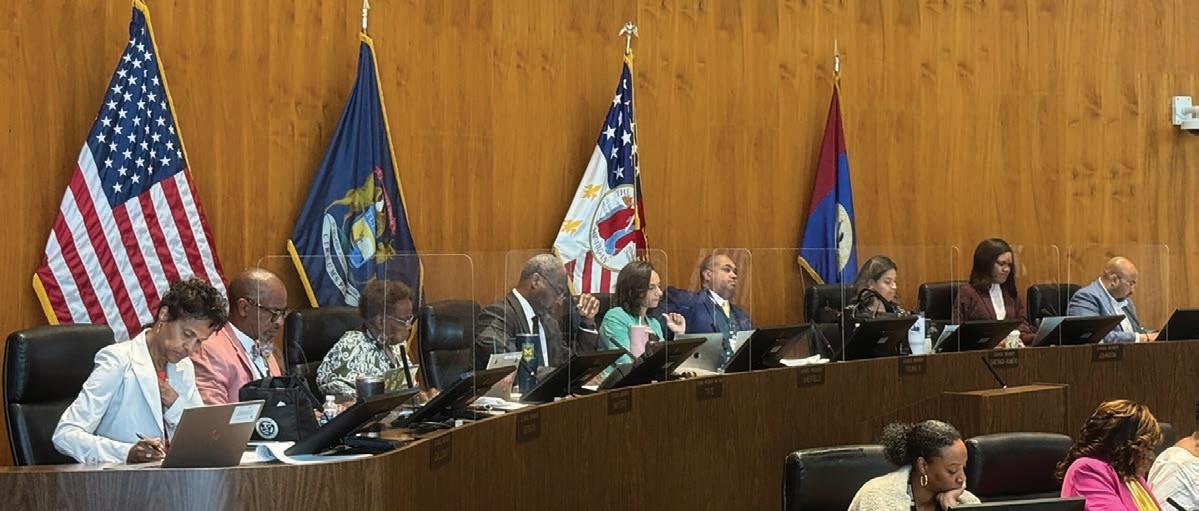
(District 1) nominated Sheffield to the position of president, while Sheffield nominated Tate to serve as pro-tem. However, campaign finance records reveal Tate donated $1,000 to Kinloch’s campaign, Sheffield’s opponent in the general election.
Tate didn’t respond to an email requesting comment on his donation or whether he would be publicly endorsing a candidate for mayor.
Neither did any of his council colleagues.
“Don’t tell me their not thinking about who their endorsing,” political strategist Adolph Mongo told Michigan Chronicle Thursday. “You can’t sit on the sidelines and say, ‘I’ll just wait and see who gets elected. If Mary is the person you want, endorse her. If Rev. Kinloch is who you want, stand with him publicly — don’t hide.”
Mongo said an endorsement from a respected council member like Tate could boost Kinloch in the general, who finished second
behind Sheffield with 17% of the vote, compared to Sheffield’s 52% in the Aug. 5 primary election.
“That would help Kinloch immensely over in Tate’s district,” Mongo said. “But sometimes people like to play both sides of the aisle.”
Mongo said council members are likely weighing a number of factors while deciding whether to endorse, such as polling, media narratives and their personal relationships with each candidate. He

said council members shouldn’t be afraid to be punished if their preferred candidate loses.
“I think people respect you more when you take a stand. They might not agree with you, or they just might,” Mongo said.


Conversations is a series of curated lectures and conversations followed by questions audiences. It features presentations by leading thought leaders in the areas of food popular culture, environmental justice, and the continuing effects of racial disparities in contemporary cultures around the globe. Designed as part of The Wright’s educational offerings, brings to southeast Michigan some of the nation’s most critically acclaimed artists and workers.
Wright Conversations is a
our audiences. It features presentations
contemporary cultures
The Wright Conversations is a series of curated lectures and conversations followed by questions from our audiences. It features presentations by leading thought leaders in the areas of food and popular culture, environmental justice, and the continuing effects of racial disparities in contemporary cultures around the globe. Designed as part of The Wright’s educational offerings, the series brings to southeast Michigan some of the nation’s most critically acclaimed artists and culture workers.
want to miss these upcoming insightful conversations! Visit our website for tickets information: www.thewright.org/whats-on/events
culture workers.
You don’t want to miss these upcoming insightful conversations! Visit our website for tickets and more information: www.thewright.org/whats-on/events
don’t want to miss these
more
COMPTON

Saturday, 9/13/25
Conversation
Cooking Demo
NINA COMPTON Saturday, 9/13/25
2pm Conversation & Cooking Demo


KEITH KNIGHT Thursday, 11/13/25 5:30pm-7pm Conversation IMANI PERRY Thursday, 2/5/26 5:30pm-7pm Conversation
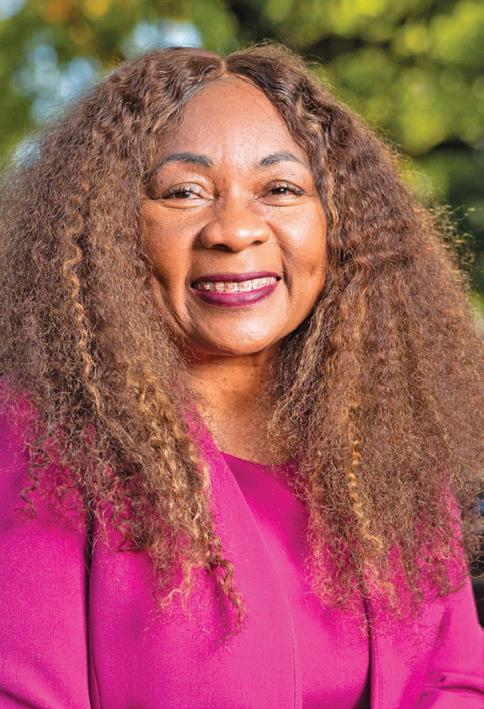
Thursday, 4/9/26 5:30pm-7pm Conversation
NINA COMPTON
Saturday, 9/13/25
2pm Conversation Cooking Demo
the 2018 James Awards “Best Chef: one of Food magazine’s “Best 2017”, Nina Chef/Owner award-winning restauCompère Lapin in Orleans’ Warehouse second venture, BABs, New Orleans’ the River” Byneighborhood. many hats, Compton also the Culinary
Winner of the 2018 James Beard Awards “Best Chef: South” and one of Food & Wine magazine’s “Best New Chefs 2017”, Nina Compton is Chef/Owner of award-winning restaurant Compère Lapin in New Orleans’ Warehouse District. Her second restaurant venture, BABs, is located in New Orleans’ “Sliver by the River” Bywater neighborhood. A woman of many hats, Nina Compton also serves as the Culinary Ambassador of St. Lucia
Ambassador of St. Lucia


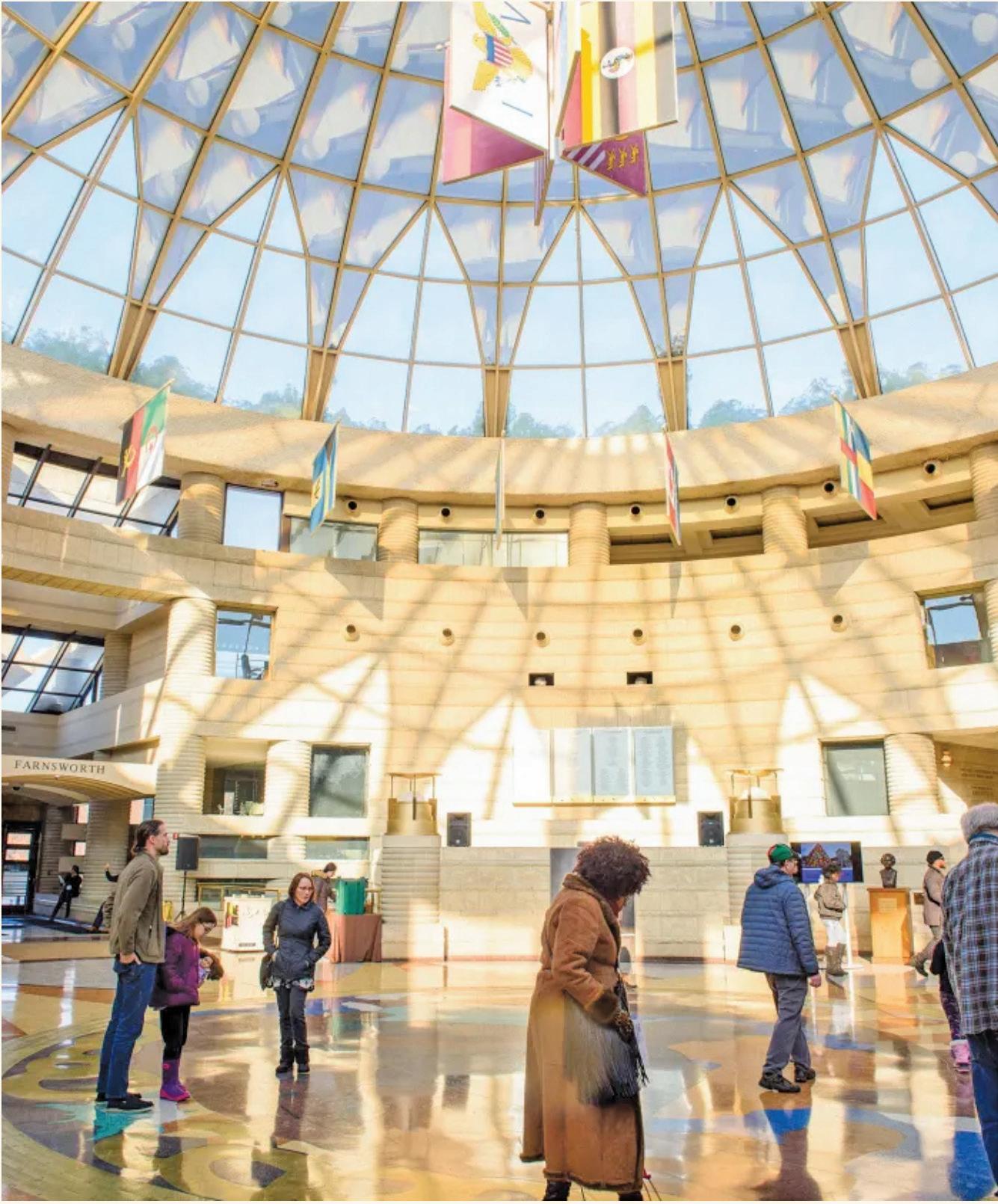
The Wright Conversations is a series of curated lectures and conversations followed by questions from our audiences. It features presentations by leading thought leaders in the areas of food and popular culture, environmental justice, and the continuing effects of racial disparities in contemporary cultures around the globe. Designed as part of The Wright’s educational offerings, the series brings to southeast Michigan some of the nation’s most critically acclaimed artists and culture workers.
You don’t want to miss these upcoming insightful conversations! Visit our website for tickets and more information:
Winner of the 2018 James Awards “Best Chef: South” and one of Food Wine magazine’s “Best Chefs 2017”, Nina Compton is Chef/Owner award-winning restau Compère Lapin in Orleans’ Warehouse District. Her second restaurant venture, BABs, located in New Orleans’ “Sliver by the River” By neighborhood. woman of many hats, Compton also serves as the Culinary Ambassador of
Keith Knight is a critically acclaimed comics creator and cartoonist. He has received the Comic-Con Inkpot, a CXC Master Cartoonist Award, several Glyph Awards for best comic strip, a Harvey Award and has been nominated for an Eisner, and an NAACP Image Award. Knight is the creator of the long-running autobio comic strip, the K Chronicles. One of the most widely distributed alt-weekly comic strips since its launch in the early nineties.
Keith Knight is a critically acclaimed comics creator and cartoonist. He has received the Comic-Con Inkpot, a CXC Master Cartoonist Award, several Glyph Awards for best comic strip, a Harvey Award and has been nominated for an Eisner, and an NAACP Image Award. Knight is the creator of the long-running autobio comic strip, the K Chronicles. One of the most widely distributed alt-weekly comic strips since its launch in the early nineties.
Born just nine years after the 16th Street Baptist Church bombing in Birmingham, Alabama, MacArthur “Genius Grant” Fellow Imani Perry was instilled from an early age with a strong instinct for justice and progressive change. The rich interplay between history, race, law, and culture continues to inform her work as a critically-acclaimed author and professor of studies of women, gender and sexuality and of African and African American studies at Harvard University.
Born just nine years after the 16th Street Baptist Church bombing in Birmingham, Alabama, MacArthur “Genius Grant” Fellow Imani Perry was instilled from an early age with a strong instinct for justice and progressive change. The rich interplay between history, race, law, and culture continues to inform her work as a critically-acclaimed author and professor of studies of women, gender and sexuality and of African and African American studies at Harvard University.
Catherine Coleman Flowers is an internationally recognized environmental activist, MacArthur “genius” grant recipient, and author. She has dedicated her life’s work to advocating for environmental justice, primarily equal access to clean water and functional sanitation for communities across the United States. As the author of Waste: One Woman’s Fight Against America’s Dirty Secret, Flowers shares her inspiring story of advocacy, from childhood to environmental justice champion.
Catherine Coleman Flowers is an internationally recognized environmental activist, MacArthur “genius” grant recipient, and author. She has dedicated her life’s work to advocating for environmental justice, primarily equal access to clean water and functional sanitation for communities across the United States. As the author of Waste: One Woman’s Fight Against America’s Dirty Secret, Flowers shares her inspiring story of advocacy, from childhood to environmental justice champion.
CATHERINE FLOWERS Thursday, 4/9/26 5:30pm-7pm Conversation

Catherine Coleman Flowers is an internationally recognized environmental activist, MacArthur “genius” grant recipient, and author. She has dedicated her life’s work to advocating for environmental justice, primarily equal access to clean water and functional sanitation for communities across the United States. As the author of Waste: One Woman’s Fight Against America’s Dirty Secret, Flowers shares her inspiring story of advocacy, from childhood to environmental justice champion.
By Elise Fields and Isaac Douglas
The Capitol Park area has long been considered a cultural and historic gem in Detroit. Some may wonder: how did we get here?
For decades, the location served as a bus transfer terminal. In 2013, the City of Detroit entrusted the Downtown Detroit Partnership (DDP) with the management and programming of the space. Helping to restore the park, the DDP brought substantial, temporary improvements to stabilize the area.
In 2017, a master plan was developed with robust community input to help guide future improvements. Just as the city was beginning to recover from bankruptcy, the global COVID19 pandemic took effect in 2020, further emphasizing the importance of accessible, outdoor public spaces.
In the spirit of true Detroit grit, we collaborated with public and private partners to build support for eight projects across Downtown. Through collective effort, funding was secured in 2022 via Michigan Economic Development Corporation (MEDC), as part of the American Rescue Plan Act (ARPA). Capitol Park was among the projects awarded during the first round of MEDC’s Revitalization and Placemaking (RAP) program.

Just last month, the DDP and partners unveiled the fully remodeled Capitol Park. The result is a testament to the power of partnership, as the DDP continually works to create spaces that are clean, safe, and welcoming for everyone to enjoy.
With the goal of creating a more connected Downtown, the park renovations significantly elevate the experience in our city center. Why is any of this important?
It helps attract people to the area, increases foot traffic for small businesses, and boosts the local economy, all of which contributes to the resurgence of tourism and vibrancy in the Downtown core.
We believe a vibrant Downtown benefits the entire city, region, and state by serving as a cultural and entertainment center while helping to drive economic growth through tourism and job creation from both large-scale and small businesses.
One of the most meaningful impacts is how these enhancements help support legacy businesses like The Last Tangle Salon and Café D’Mongo’s, while also making room for newer establishments to bring fresh, new energy to the area.
In fact, four new businesses recently opened in the Capitol Park area, helping to enhance the vibrancy and vitality of the space:
• Culture Detroit, the city’s only Black-owned sneaker and designer streetwear store, offering buy, sell, pawn, and consignment options
• 3 Kings Sports Cards, adding variety and collector culture to Downtown
• Chaos Burger is a new restaurant to the surrounding neighborhood.
• Parlay Detroit introduces a newly imagined sports bar to the area.

By Ebony JJ Curry SENIOR REPORTER
This October, the $75 million Ralph C. Wilson Jr. Centennial Park will open to the public, capping three and a half years of construction and delivering a 22acre destination that city leaders say will change how residents and visitors experience the river. The park’s grand opening is set for the weekend of October 25–26, with free activities and programming expected to draw more than 50,000 people, based on past attendance at the Detroit Riverfront Conservancy’s Harvest Fest. This year, portions of that festival will move into the new park, blending its fall traditions with a major civic debut.
The park’s opening comes alongside another long-anticipated link in Detroit’s riverfront network: a new boardwalk running 17 feet from the water’s edge in front of Riverfront Towers, part of the West RiverWalk. The addition will allow people to travel nearly five miles along the Detroit River without interruption—from the MacArthur Bridge to Belle Isle, west past the former Joe Louis Arena site, over the boardwalk, through Centennial Park, and up the Southwest Greenway to the Michigan Central campus in Corktown. It represents the latest step toward the Detroit Riverfront Conservancy’s vision of 5.5 miles of continuous public access.
The park is named for the late Ralph C. Wilson Jr., founder of the Buffalo Bills, whose foundation made the initial gift that launched the project. The announcement came on what would have been his 100th birth-
By Darryl Jacobs CONTRIBUTING WRITER
This summer, the Motor City Cruise—the NBA G League affiliate of the Detroit Pistons—proved that basketball is more than just a game. Through camps, clinics, and community events, the Cruise brought youth and families together, fostering a sense of community and togetherness that inspired young people and created memories that will last far beyond the final buzzer.
In total, the Cruise connected with nearly 1,000 youth and families, sharing not just basketball skills but also lessons in teamwork, confidence, and perseverance, empowering them to grow personally and inspiring them to reach their full potential.
Mini-Cruisers Take the Court
One of the biggest highlights of the summer was the launch of the first-ever “Mini-Cruisers” camp at Wayne State Fieldhouse. Dozens of kids laced up their sneakers and stepped onto the same court where the Cruise competes during the season.
The camp wasn’t just about basketball; it was a platform for building friendships, learning the value of hard work, and fostering personal growth as young leaders.
day, October 17, 1918. In a statement, Matt Cullen, chairman of the conservancy’s board, called the new destination “one of the most iconic public spaces in the country” and said it “will represent a massive step towards the completion of our vision for 5.5 miles of perpetual public access to our revitalized riverfront.” He also credited the Wilson Foundation for “launching this vision for Detroit” and expressed gratitude to “the many partners that joined them in turning this vision into a reality, such as William Davidson Foundation, Huron-Clinton Metroparks, Delta Dental, Erb Foundation, DTE Foundation, and all of the other benefactors who have made this achievement possible.”
Designed by Michael Van Valkenburgh Associates, the New York landscape architecture firm behind Brooklyn Bridge Park and Chicago’s Maggie Daley Park, Ralph Wilson Park features work from internationally acclaimed architect Sir David Adjaye. Known for projects like the Smithsonian National Museum of African American History and Culture, Adjaye designed the park’s comfort stations and the William Davidson Sport House, bringing a level of architectural ambition rarely seen in public recreation spaces.
Four major attractions anchor the park. The William Davidson Sport House will feature two open-air regulation basketball courts beneath a raised canopy with a skylight, as well as flexible space for community events. The Delta Dental Play Garden, a five-acre playground, will offer large-scale play structures inspired by native Michigan wildlife, including a 23-foot bear slide. The

“Providing youth with a well-rounded experience in addition to elevating their basketball skills is our purpose,” said China Jude, Team President for Business Operations. “Our goal is more brand awareness and to thank the community for their support over the years. We want every child to walk away feeling inspired and supported, knowing they can accomplish great things both on and off the court.” Chandler Park Community Takeover
The Cruise also took their passion for the game out into the neighborhood with a special basketball clinic at Chandler Park. About 30 kids joined in, along with their families who cheered them on from the sidelines. It was a true community celebration. Laughter filled the air as youth learned new skills, competed in games, and
built confidence with every dribble. Parents and guardians shared in the excitement, proud to see their children engaged in something positive and uplifting. Inspiring Through Mentorship For many youths, meeting and learning from professional coaches was the most exciting part of the experience. Associate Head Coach Marcus Stout shared why these opportunities mean so much to him:
“Getting into the communities and providing some of the
From page B-1
Huron-Clinton Metroparks Water Garden will cover 2.5 acres, transforming into an ice-skating space in winter. The DTE Foundation Summit will provide a sweeping green lawn for special events and winter sledding. Across the site, visitors will find outdoor classrooms, new plantings, and nearly 900 trees—about 750 of which are already in the ground.
Getting the project to this point required a significant financial intervention last year. In the wake of the Detroit Riverfront Conservancy’s former CFO embezzling more than $40 million, the Ralph C. Wilson Jr. Foundation committed $35 million in new funding—$10 million in a grant and a $25 million loan guarantee—to keep work on schedule. The Community Foundation for Southeast Michigan stepped in as fiduciary for that funding, helping secure additional commitments while the conservancy worked to stabilize operations. That emergency financing ensured contractors could be paid and construction could continue without delay. The conservancy is now leading the effort to raise the $25 million needed to satisfy the loan guarantee, with both foundations continuing to collaborate closely.
Currently, about 90 percent of the park is complete. Remaining work includes planting around the water garden and installing a Detroit Pistons–branded court floor in the William Davidson Sport House, a nod to Davidson’s decades-long ownership of the team from 1974 until his death in 2009. The park’s design aims to support year-round use, with spaces that can adapt to seasonal shifts in activity—from skating and sledding in winter to concerts and festivals in the warmer months.
The opening of Ralph Wilson Park will bring Detroit significantly closer to a fully connected riverfront, but some work will remain. Following its debut, roughly two-thirds of a mile of the RiverWalk will still need to be completed to the west, linking Rosa Parks Boulevard to Riverside Park near the Ambassador Bridge. That final stretch will extend the path to the city’s edge, cementing the riverfront as a continuous public space in a city where such access was once cut off by industry, freeways, and disinvestment.
The park’s location at 1801 W. Jefferson Ave. places it within reach of both longtime residents and new visitors drawn to Detroit’s growing cultural and recreational offerings. Its mix of active play areas, open green space, and event infrastructure reflects a de-

liberate effort to make the riverfront a place where people from all neighborhoods can gather. The scale of investment, combined with the nationally recognized talent behind its design, signals the city’s commitment to building public spaces that match the ambition of its redevelopment narrative.
For Detroiters who have watched the east RiverWalk transform over the past two decades, the westward expansion is both a continuation and a turning point. The boardwalk past Riverfront Towers, once a missing link, will now be a direct connection between east and west, past and present. Centennial Park’s programming is ex-
From page B-1
Nearby favorites like Eatori and Leila offer patio seating with beautiful, scenic views while urban street wear retailer Xhibition brings unique flavor and distinctive style, enhancing the shopping options.
While SPKRBOX energizes the area with vibrant day and nightlife attractions, the park adds value by creating a strong sense of place. Serving as an outdoor living room of sorts, it’s the ideal gathering spot for kicking off the evening or winding down the night.
Beyond its economic impact, Capitol Park holds deep historical significance. It once served as a stop on the Underground Railroad and was home to the Detroit Plaindealer, one of the nation’s first African American newspapers. This legacy is thoughtfully preserved and celebrated through this renovation.
Public space improvements of this
pected to attract a broad cross-section of the city, while its integration into the broader greenway network offers new routes for walkers, runners, and cyclists.
As the October opening approaches, the focus is on finishing touches and preparing for what the conservancy expects will be one of the largest public gatherings on the riverfront in years. Food trucks, live music, and seasonal activities will set the tone, but the real draw will be the chance to walk into a space that has been years in the making—a place built to serve Detroit in all seasons, for decades to come.
kind represent more than just physical upgrades; it’s an investment in Detroit’s cultural legacy and economic future. Recent upgrades include an expanded lawn that transformed the previously concrete-heavy space into a greener area complete with new lighting and seating, and beautiful views of the surrounding skyline.
Additional funding was provided by the City of Detroit Downtown Development Authority, the Knight Foundation and The Kresge Foundation.
Capitol Park officially reopened July 23, followed by a series of programming that is free and open for all to participate. Community Yoga with Citizen Yoga is held every Wednesday through August 31 from 6 p.m. to 7 p.m., Visit the DowntownDetroit.org website to learn about other upcoming events happening at Capitol Park.
Projects like this are not done alone. We make it happen together with a long-term vision, community input with the goal of achieving sustainable impact for all who live, work, and play in the Downtown.
From page B-1
youths with an opportunity to experience our camps and clinics can be inspiring and life-changing,” said Stout. “Growing up here, I know the importance of giving back, and that is our goal. We want these young people to know they matter and that their dreams are within reach.”
These moments of mentorship reminded kids that basketball isn’t just about the score; it’s about believing in yourself, working hard, and being part of a team. Building Stronger Families and Communities
The Cruise’s summer activations were designed to be more than just sports camps. They aimed to provide young people with a safe, supportive space to grow, while also bringing families closer together. Parents were able to watch their children learn, laugh, and challenge themselves, all while being surrounded by role models who genuinely care.
Over the course of the summer, nearly 1,000 youth and families were positively impacted through these activities. Whether on the court at Wayne State Fieldhouse or at a neighborhood park, the Cruise created opportunities for kids to feel seen, encouraged, and inspired.
Looking Ahead: A Milestone Season
As the Motor City Cruise gears up for its next season, the impact of the summer is already evident. Youth who participated in a camp or clinic will carry with them new skills, new friendships, and the confidence that they can succeed. Families who joined the events will remember that the Cruise is more than a basketball team; it’s a dedicated partner in building a brighter future for Detroit.
The 2025 season is also a special one for the Cruise, as the team celebrates its 5th anniversary. The milestone year will tip off in style with the season opener at home on November 8th at Wayne State Fieldhouse.
“Our mission goes beyond basketball,” said Jude. “It’s about creating experiences that leave a lasting impression on youth and families. That’s what makes this work so meaningful.”
Final Thoughts
Through the Mini-Cruisers camp, Chandler Park takeover, and community clinics, the Motor City Cruise showed the true power of sports: to inspire youth, strengthen families, and bring communities together.
With nearly 1,000 lives touched this summer, the Cruise continues to prove that every dribble, every cheer, and every handshake can make a difference. For Detroit’s youth and families, the game of basketball has become so much more than a pathway to growth, joy, and hope.
The excitement doesn’t stop there—this season marks the Cruise’s 5th anniversary, and fans are invited to join the celebration. Be there for the season opener at Wayne State Fieldhouse on November 8th. For ticket information, contact the Motor City Cruise front office or visit the team’s official website: Cruisebasketball.com
ABOUT AUTHOR:
Darryl Jacobs is a nationally recognized ESPN & CBS Sports Networks Commentator/Analyst, former successful college basketball head coach, athletic administrator, and professional sports executive with over two decades of experience in collegiate athletics and professional sports.

Health care focuses on individual patients. Public health focuses on entire populations. Medical teams work together to prevent, diagnose and treat a person. Local and state public health teams work together to prevent disease in communities across the state.

Here are some of the ways they keep Michiganders healthy:
They educate the public about health. Whether it’s educating people about cancer screenings, HIV treatment options or safe sleep for babies, public health educates people. Different programs guide people to valuable information, resources and support to improve their quality of life.
They bring health care closer to home. Maybe you’ve seen the mobile health clinic in your neighborhood or have visited your local health department for vaccinations or health screenings. By increasing access to quality health care, public health helps keep more people healthy.
They increase access to healthy food. That local farmers market you love? You may see your local health department there, supporting healthy food options.
They do hearing and vision screenings in schools. So children with hearing and vision issues are diagnosed and treated early, before it impacts their education. They support newborns and young children. With free newborn health screenings and the WIC program, that provides supplemental nutrition, breastfeeding information and other resources for healthy mothers, babies and young children up to age five. They support children with special health care needs. For parents and caregivers of children with chronic or severe medical conditions, public health workers connect them to resources and help.
There is so much more public health does to help protect the people, communities and the environment in which we live. To learn more or connect with your local public health department, visit Michigan.gov/PublicHealth.
As a City Councilman, I’m fortunate to meet incredible people who champion our community. One such individual is Pastor Maurice Hardwick, widely known as Pastor Mo, or “Street Sweeper.” A dedicated community violence intervention leader in the 3rd District, Pastor Mo works tirelessly to guide individuals, especially young men, away from a life of crime.
This year, at the Rally for Rylee, Pastor Mo shared a powerful truth that resonated deeply with me: “You cannot afford to commit crime!” His message highlights a critical point: the extreme, often overlooked, costs to you and your family if you choose a criminal path. I want to amplify this vital message, showing you why the perceived allure of quick money or power from crime is a dangerous illusion. The price tag attached to committing any crime, especially nonviolent offenses like theft, burglary, or shoplifting, is multifaceted and astronomically high – a cost few consider, and one no one can truly afford.
work experience, or advancing your career. The opportunity cost of incarceration is staggering; studies show you could lose $500,000 or more in lifetime earnings (Prison Policy Initiative, 2025). This isn’t just about missing a few paychecks; it’s about potentially forfeiting your entire economic future. A criminal record, even for a nonviolent offense, slams shut doors to higher education, trade schools, and nearly all legitimate career opportunities. You’ll likely be limited to low-paying, demanding jobs that are hard to secure. The fundamental wealth-building opportunities – homeownership, starting a business, traveling, or simply living a stable, flourishing life – become increasingly unattainable. Your life will stagnate, devoid of the basic opportunities and personal freedoms that law-abiding citizens enjoy.

First, consider the immediate financial and legal burden that will crush you and your family. While public defenders are a constitutional right, the process is still grueling. If you opt for private counsel, even for nonviolent felonies like grand theft or serious burglary, legal fees can quickly reach tens of thousands of dollars, or even more for complex cases. The cost of a murder defense can soar beyond $100,000. These costs often involve hiring investigators or expert witnesses to analyze evidence. Should you be found guilty, the financial penalties don’t stop there. Judges frequently levy substantial fines, sometimes thousands of dollars or even triple the value of stolen property, which you will be legally obligated to pay.
Beyond legal fees and fines, consider the direct cost of any incarceration. For a felony, you could face years in prison; for a misdemeanor like shoplifting, even 93 days to a year in jail is possible, depending on the value and your record (DeBruin Law, PLLC). While taxpayers fund the prison system, every day you’re incarcerated is a day you lose potential earnings, accumulating a significant “debt” in lost wages and personal freedom.
Being confined in jail or prison means you’re not earning a living, gaining valuable
The impact of your actions also extends devastatingly to your family, forcing them to pay a heavy emotional and financial price. The stress and heartache inflicted upon your parents, siblings, children, and partner are immense. Your incarceration creates a financial strain, as they may struggle to cover your legal fees, pay exorbitant charges for phone calls from prison, send commissary funds for your basic needs, and afford the expense of traveling hundreds of miles for infrequent visits (UIC Jane Addams College of Social Work, 2020). If a family member dies while you’re in prison, you won’t be attending their funeral to pay your respects. Also, your family will face a pervasive social stigma and judgment. If you are a parent, your children will be disadvantaged, potentially caught in an intergenerational cycle of criminal involvement, perpetuating hardship and trauma across generations (Televerde Foundation; National Council on Family Relations).
Finally, life after incarceration doesn’t get easier; you will carry the permanent scar of a ruined reputation. Even for nonviolent crimes, a conviction creates an indelible stain that follows you for the rest of your days. This damage to your reputation impacts personal relationships, breeds distrust in the community, and significantly limits your options for housing and social reintegration. Your right to vote may even be restricted in several states.
The perceived “gains” from nonviolent crime – a few dollars from a theft, a moment of perceived power – are minuscule compared to the life-altering consequences. Consider the numbers: a few hundred or a thousand dollars gained illegally versus thousands in legal fees, years of lost wages and opportunities, family devastation, and a permanently tarnished reputation. The math simply doesn’t add up. As Pastor Mo wisely states, “You cannot afford to commit crime.”
Hon. Scott Benson is a Detroit City Councilman who represents the 3rd District on Detroit’s northeast side. Councilman Benson is an Urban Planner by training with a long background in real estate, business, and community development within Southeastern Michigan. Scott also serves his community by sitting on numerous boards, is an avid cyclist, and a proud husband and father.


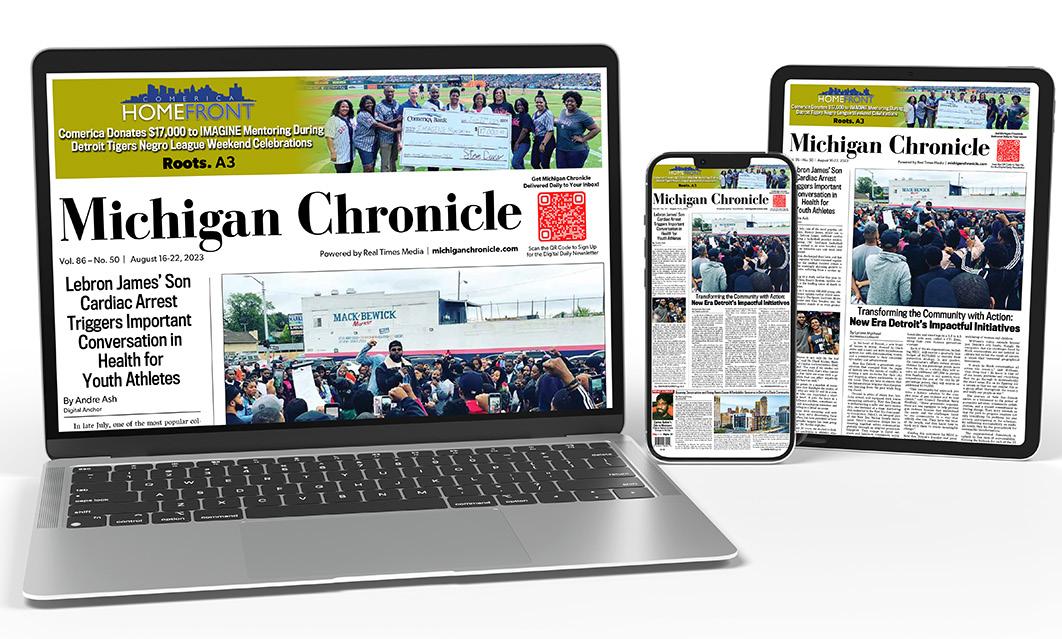



By Darryl Jacobs
WRITER
CONTRIBUTING
Behind the Spotlight: The Harsh Reality of Pro Sports
The brutal truth of professional sports goes far beyond the physical grind or the pressure to perform—it’s a ruthless business that silently sorts athletes into A, B, and C-lists. One moment you’re the headline star with sponsors clamoring for your attention; the next, you’re a forgotten name struggling to keep your brand alive. Yet, despite these challenges, athletes show remarkable resilience. Having worked closely with professional athletes, I can tell you the toughest battle begins when the cheering stops—and no one wants to admit it, MENTAL HEALTH.
The Intoxicating Highs and Invisible Battles
On the surface, professional sports look like the ultimate dream: the bright lights, the big contracts, the fans chanting your name. The stardom, the money, the lifestyle, it’s intoxicating. But behind all the glitz lies an invisible opponent that doesn’t show up on the stat sheet—mental health.
The pressure to perform night after night is relentless. One bad game, one missed shot, and the world is ready to judge you. Social media amplifies this in real time, flooding your mind with criticism and doubt. For many athletes, this relentless scrutiny chips
away at confidence and feeds anxiety.
When the Game Ends: Facing the Silent Crisis
Yet the most profound challenge comes when the career ends. Injury, age, or the unforgiving business side of sports can cut careers short without warning. And here’s the hard truth: your brand as an athlete is rarely sustainable. I’ve seen firsthand how the industry quietly classifies players into “A, B, and C-list” tiers.
When you’re A-list—at the top of your game, winning awards, trending online— your phone rings constantly. Sponsors want you, the media is taking notice, and the world is watching. Drop to B-list, and the calls slow. You’re still respected, but no longer the headline. Slide into C-list— typically post-retirement—and you often become invisible to the very people who once fought to be near you.
Financial Lifelines: Lessons from Iverson and Bonilla
Take Allen Iverson, for example. Reebok didn’t just build a brand around “The Answer” during his playing days—they structured a deal that set money aside for him to access only after he turned 50. This arrangement created a financial safety net that many athletes lack and helped ease the mental strain that comes with uncertainty after the game ends.
On the flip side, consider Bobby Bonilla—an MLB player whose agent negotiated a contract with the New York Mets that has become legendary for its deferred payments. While the deal guarantees him millions annually long after retirement, this financial security has eased his mental state, allowing him to live comfortably without the constant pressure many retired ath-
letes face. These examples highlight how thoughtful financial planning can be vital to protecting mental health after sports.
The Identity Crisis: Letting Go of “The Athlete”
But it’s not just an ego hit, it’s an identity crisis. For years, athletes have been intoxicated by fame, fortune, and constant applause. Yet few prepare for the day their value isn’t tied to performance anymore. No more practices. No more game days. No more travel. Suddenly, you’re adrift in silence.
Support Systems: Are They Enough?
Organizations like the NBA Retired Players Association and NFL Alumni offer support and programs for former players, but many retirees express frustration that these efforts aren’t enough. It’s crucial that we, as a community, step up and provide the resources and support these athletes desperately need. Resources can be limited, and outreach inconsistent, leaving too many former athletes struggling without the help they desperately need.
Women Athletes: Facing Unique Challenges
Women athletes face many of the same pressures, but often with fewer resources and less media attention. In my years working closely with professional athletes—men and women alike—I’ve seen some pivot successfully into businesses, broadcasting, coaching, or community leadership. Others struggle in isolation, battling depression, anxiety, and sometimes financial hardship. The hardest part? Acceptance—letting go of the life you’ve built around being “the athlete.”
Breaking the Silence of Mental Health
The stigma around mental health in
sports has been a wall for too long. Athletes are taught to “tough it out” and “never show weakness.” This silence has cost many dearly. Mental health struggles don’t discriminate by gender, fame, or fortune—in fact, success often makes you more vulnerable because the fall is steeper. It’s crucial that mental health advocates, along with sports organizations and the public, work together to break this silence and provide the necessary support.
The Public’s Misunderstanding Public perception complicates matters. Fans assume pro athletes have it all— money, fame, security. But careers can end suddenly, sometimes mid-contract, leaving many unprepared financially or emotionally. The financial challenges can be significant, especially if the athlete hasn’t planned for a post-sports career. And when your brand fades, so do opportunities, leading to a sense of loss and identity crisis.
Changing the Culture: What Needs to Happen
We must change our culture. Sports organizations should do more than celebrate performance—they must prepare athletes for life after the final whistle. That means comprehensive career counseling, financial education, and mental health resources that don’t stop when retirement starts. It’s not just about providing these resources, but also about ensuring they are easily accessible and tailored to the unique needs of each athlete.
Sponsors need to rethink athlete partnerships as long-term investments, not disposable marketing tools. An athlete’s influence extends beyond the court or field. Many of the most impactful contributions happen after playing days, through mentoring, advocacy, and community work.
A Call to Action
I’ve witnessed success stories—former pros who reinvent themselves and thrive in new roles. But I’ve also seen far too many fades into obscurity, forgotten by the very industry they gave everything to.
The applause always stops eventually. The question is: will sports culture recognize that what happens after matters just as much as what happens during the game?
Because when the clapping stops, the real game begins—and no athlete should have to face it alone.
About the Author
Darryl Jacobs is a nationally recognized basketball analyst affiliated with ESPN, CBS, and NBA TV Sports Networks, and a seasoned sports executive. With more than 20 years of experience spanning higher education, corporate and professional sports leadership, and nonprofit management, he brings a comprehensive understanding of the industry. Darryl has collaborated extensively with professional athletes and has held leadership roles on several national boards focused on education, athletics, and community development.

Vehicle Towing, Storage, and Clean Up
The City of Highland Park (“City”) is seeking proposals from qualified and experienced firms (“Contractor”) that are able to provide the City with vehicle towing, storage, and cleanup services.
Sealed Bids must be received by 12:00 noon Local Time on Wednesday, September 10, 2025
Ms. Brenda Green Office of the Clerk, City of Highland Park
12050 Woodward Ave Highland Park, MI 48203
Sealed Bids will be opened Monday, September 15, 2025, at the City Council Meeting at 7:00 p.m. (Local Time)
City of Highland Park City Hall Building
12050 Woodward Ave
Highland Park, MI 48203
All qualified vendors are encouraged to bid on all City of Highland Park projects.
The City of Highland Park reserves the right to waive any irregularity, to accept or reject any or all bids, and to accept the Bids that, in the City’s opinion, are in the best interest of and to the advantage of the City of Highland Park. No bidder may withdraw his bid within 90 calendar days after the date of bid opening. Copies of the RFP are available on BidNet or by e-mailing to: rburgess@highlandparkmi.
gov
Sealed Bids will not be received unless complete information, as required in the RFP package, is delivered to the City Clerk’s office on or before 12:00 noon Local Time on Wednesday, September 10, 2025. City of Highland Park Brenda Green, City Clerk
The Suburban Mobility Authority for Regional Transportation (SMART) is soliciting RFP Control No. 26-4314 for Paratransit Software Integration Project Manager. RFP forms may be obtained beginning August 27, 2025, from http://www.mitn.info. Proposals are due by 3:00 PM ET, Friday, October 3, 2025.
ADAS MBD Software & Autocode Engineer
Positions offered by Ford Motor Company (Dearborn, Michigan). Position reports to Dearborn, MI office. Telecommuting permitted in accordance with company policy, but must live within commuting distance of stated office. Autocode generation of MBD software to support development related to ADAS features, including specifications, model and code implementation, verification, and validation. EOE. Apply online: corporate.ford.com/careers

(Family Features) Entrepreneurship is a career goal for many working adults. Autonomy and personal satisfaction are just a couple of the benefits of running your own business.
U.S. District Court, Eastern District of Michigan – Court Administration Specialist Announcement at https://www.mied.uscourts.gov/ PDFFIles/25-18_Court_Administration_
The New Light Baptist Church Pulpit Committee COURT ADMINISTRATION SPECIALIST
2 cols x 2.5 inches SENIOR
Senior Project Engineer FEV North America, Inc.: We seek a Senior Project Engineer based out of our office at 4554 Glenmeade Lane, Auburn Hills, MI 48326. Note, this position does not require travel. Specializing in powertrain calibration and development, focus on base engine and OBD calibration and validation activities in engine dyno and in vehicle; among other duties. Equal opportunity employer as to all protected groups, including protected veterans and individuals with disabilities Apply to job reference number 25-00029 at: www.fev.com
Senior Project Engineer FEV North America, Inc. seeks a Senior Project Engineer in Auburn Hills, Michigan. Conduct vehicle and/or engine testing; Specializing in powertrain calibration and development, focus on base engine and OBD calibration and validation activities in engine dyno and in vehicle; among other duties. Equal opportunity employer as to all protected groups, including protected veterans and individuals with disabilities Apply to job reference number 25-00038 at: www.fev.com
Software Development Lead Engineer
REQUEST FOR PROPOSALS (RFP)
CONSULTANT – CUSTOMER SERVICE AND SECRET SHOPPER SURVEY DEVELOPMENT, DISTRIBUTION AND ANALYSIS October 2022
5. Participate in process improvement initiatives including test framework and process automation. Position requires: Bachelor’s Degree in Mechatronics, Electrical and Electronics, Robotics and Autonomous Systems, or Computer Engineering, or Computer Science, or foreign equivalent education, and 1 year experience working in the software validation field in the position of Software Engineer, Validation Engineer, Robotics Validation Engineer, Software Quality Assurance Engineer or other Software Engineering position. 1 year experience is required in each of the following:
BorgWarner PDS (USA), Inc. seeks a Software Development Lead Engineer based out of our office at 3800 Automation Avenue, Auburn Hills, MI 48326. Note, this is a hybrid position whereby the employee will work both from home and from the aforementioned office address. Hence, the employee must live within a reasonable commuting distance of the aforementioned office address. Note, this position requires international and domestic travel up to 5%. Conduct software configuration management, software requirements, software integration, software releases, and development environments among other duties. Apply to job reference number R2025-3030 at borgwarner.com/careers
Detroit Local Initiatives Support Corporation (LISC) is seeking proposals for a qualified consultant to work with Detroit LISC to create, distribute and analyze customer service surveys to gather information about the services of the Detroit at Work One Stop System. The findings from the surveys will be analyzed and put into interim and final reports to be submitted to LISC. Specifically, Detroit LISC is seeking those with proven experience in the following areas:

1. Working with requirements and test management tools, including IBM DNG, or ETM, or RTC, or Atlassian Confluence, or Jira, or TestRail.
2. Conducting manual and automated test execution for software qualification or system integration for embedded systems.
3. Working with embedded systems testing and development tools.
Visit https://www.lisc.org/detroit/about-us/careers/ to download full RFP. Responses to this RFP are due Friday, October 21 and should be emailed to kgallick@lisc.org. LISC is committed to working with Small Business Enterprises (SBEs), Minority-Owned Business Enterprises (MBEs), and Women-Owned Business Enterprises (WBEs). LISC encourages submissions from SBEs, MBEs, and WBEs. ✓ Evaluation ✓ Survey Creation, Distribution and Collection
4. Maintenance, design and specification of tests plans, test cases and test frameworks.
5. Support issue analysis and debugging with hardware and software development teams through testing. Experience may be obtained concurrently. Applicants should apply online at aam.com and reference Job ID# JREQ-217943.

from http://www.mitn.info. RFQs are due by 3:00 PM ET, November 11, 2022



p.m. If you have questions, please contact the Procurement Department at (313) 873-6531.

It’s a professional path about 3 in 5 teens would prefer over a traditional job, according to a survey by Junior Achievement (JA). Running a successful company depends on multiple factors, including a solid business plan, adequate startup resources and a receptive market, as well as a strong sense of responsibility, work ethic and ability to persevere under pressure. Beginning to shape the skills and mindset necessary to flourish as an entrepreneur can begin well before entering the workforce. In fact, even students in junior high and high school can begin working toward entrepreneurial goals with these tips from JA, a nonprofit that inspires and prepares young people by delivering lessons in financial literacy, work and career readiness.
Select Electives Wisely

Students don’t have to wait until they’re in college to begin developing business skills and knowledge. If they have the ambition and drive to become an entrepreneur, they may find it beneficial to complement the classes needed for graduation requirements with electives that allow them to explore their interest in the business world. Some examples include accounting, marketing, finance, economics, psychology and computer science.
Make Part-Time Work Meaningful
Many students enter the workforce in high school to start practicing money management and contribute to expenses like gas and car insurance. While most jobs available to students are service oriented and fall outside the business world, it doesn’t hurt to explore options that put students closer to their entrepreneurial ambitions. For example, local small businesses may be willing to hire someone eager to learn.
Take Part in Programs
Kids can challenge themselves by putting their knowledge into practice as real-world entrepreneurs. For example, JA’s Company Program is an immersive program that fosters creativity, critical thinking and business acumen, offering students unique opportunities to explore the world of business and economics by creating real companies. Participants learn to present their business plans and results during competitions that offer learning opportunities. Additionally, at the Future Bound competition (made possible through the support of businesses including Chick-fil-A, Delta Air Lines, Pacific Life Foundation and Staples), participants took part in seminars and mentorship. The event featured four programs that empower students with entrepreneurship and financial literacy skills – the Company of the Year National Competition, the Social Innovation Challenge, the Titan National Competition and the National Stock Market Challenge.
Seek a Strong Mentor
Detroit People Mover/Detroit Transportation Corporation 535 Griswold St Ste # 400 Detroit, MI 48226
Some of the best learning comes from emulating others who are successful in their fields. Meeting regularly with someone who serves as a role model can help students sharpen their vision for the future and learn from the experiences that propelled professionals into their current positions. Define a Future Vision
Creating an inspiration board can help motivated students compile and organize ideas. This board, whether physical or digital, can serve as a source of inspiration and help motivate students to identify and overcome obstacles while working toward bringing their visions for careers as entrepreneurs to life.
BID # 07-01-2022 REBID
Find more ideas to help students gain confidence and skills for future education and careers, and learn more about the competitions, at jausa.ja.org.
The Detroit Transportation Corporation Office of Contracting and Procurement requests proposals from qualified firms to provide CCTV and network upgrades. This includes modernization efforts for the CCTV system, Public Address (PA) system, Variable Message Signs (VMS), and Wired Backbone Network system, at the MCF, at each DPM station, and at substations described herein.
All bids must be received by the Detroit Transportation Corporation via Bidnet/MITN on or before 5:00 p.m. (EST) November 7, 2022. A pre-bid site visit will be determined at a later date, if necessary. Proposals can be accessed on the Bidnet Direct www.bidnetdirect.com//detroit-transportation-corporation
(StatePoint) As a new school year gets underway, it’s time to zero in on the tech products that can help your students ease into their academic routines and succeed in the classroom. Here are some of the greatest products on store shelves today that can transform a student’s relationship to school subjects ranging from STEM and language arts to music and physical education: Math made magical: Put the best tools in the hands of your math wizard with the fx-991CW
Mike Anderson Procurement Manager mandersonjr@thepeoplemover.com
Detroit People Mover/Detroit Transportation Corporation 535 Griswold St Ste # 400 Detroit, MI 48226
BID # 08-8-2022 REBID

ClassWiz, the latest enhancement to Casio’s scientific calculators. With an all-new quadruplegraded LCD display, your student will be able to easily find their cursor while writing and modifying expressions. All of the calculator’s functions can be accessed through a convenient Math Catalog, which also hosts 47 scientific constants and 40 measurement conversions. By partnering the ClassWiz with an internet-capable mobile device and scanning a QR code on the calculator’s screen, solutions can be graphed and visualized through the Casio-hosted virtual workspace, ClassPad. net.
The Detroit Transportation Corporation Office of Contracting and Procurement requests proposals from qualified Contractor/Firm(s) to provide annual geometry measurements of the LIM rail height, power rail tolerances, running rail height and track gauge. The initial information and subsequent trending information on the rate of change of the measured parameters of the
Note-taking made simple: When it comes to synthesizing information, there really is no replacement for writing things down by hand. Now, there’s a simple way to take notes the “oldfashioned way” while getting all the benefits of digitization. With a smart pen, your student’s handwritten notes are compatible with all their devices. These notes are also editable, searchable and highlightable, taking the fuss out of studying for exams and organizing materials for essays. Music made beautiful: Bring life and light to your young music student’s world with the CT-S1. The sleek minimalist design and uplifting sound of this Casio keyboard will allow them to focus solely on the music, develop their unique style, and energize and encourage them to play more. With a simple interface, and a color palette to suit every aesthetic, the functionality and design of the CT-S1 is all about the individual musician, and its compact design and portability are well-suited for on-the-go students short on space.
Sports made supportive: Student-athletes can hone their skills in their sport of choice with new technology. From smart footballs that track spiral velocity and throw distance to connected soccer balls that measure trajectory, speed and spin, today’s tech tools on the field function like a coach available to offer detailed, accurate feedback 24/7. This school year, you can encourage your student to thrive. With the latest and greatest technology, they can be inspired and supported to meet their potential.
Let’s




